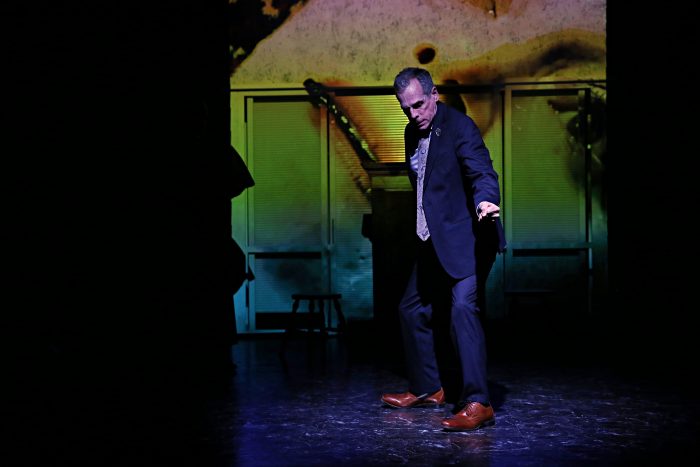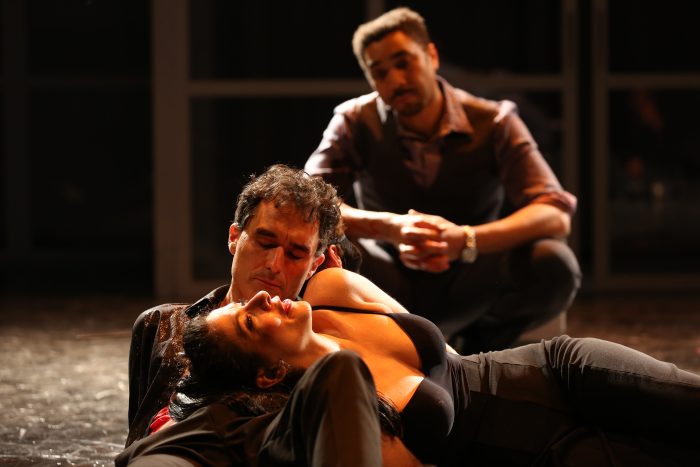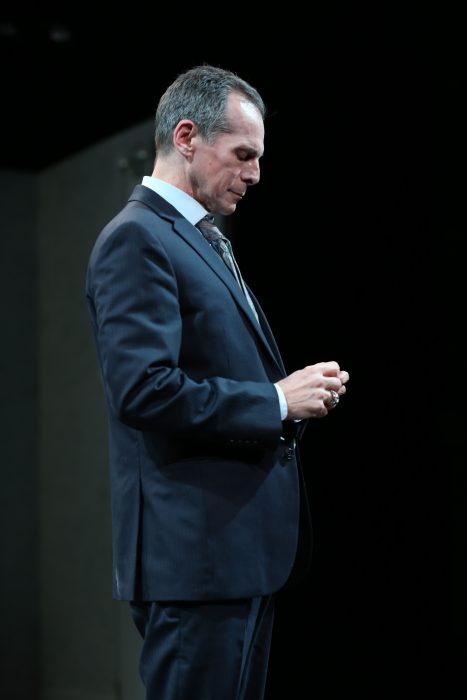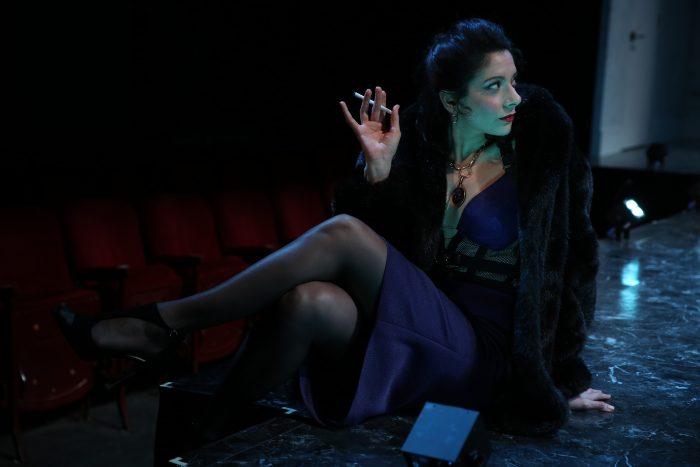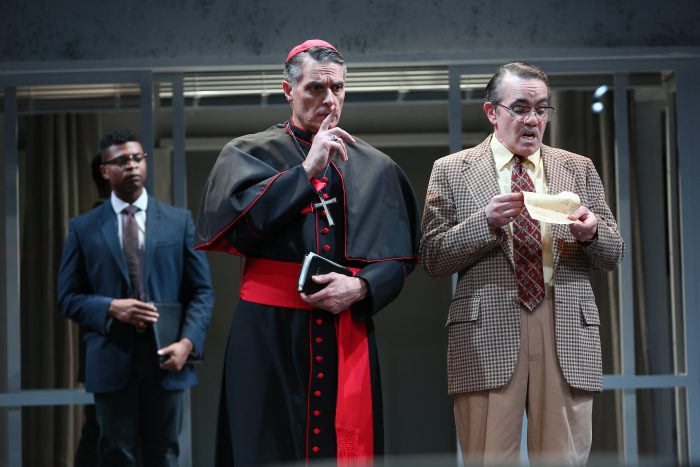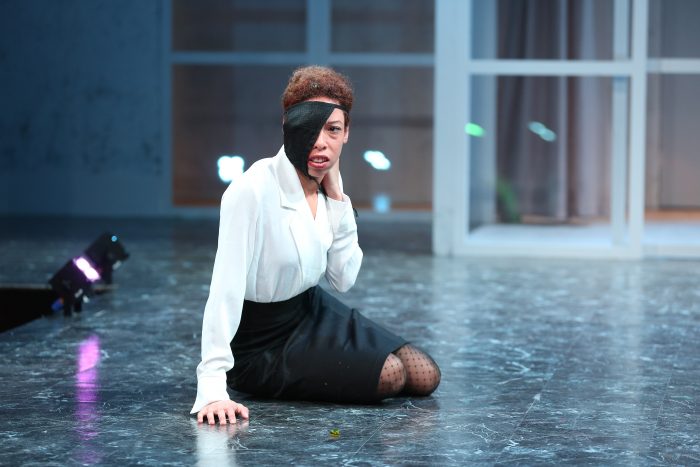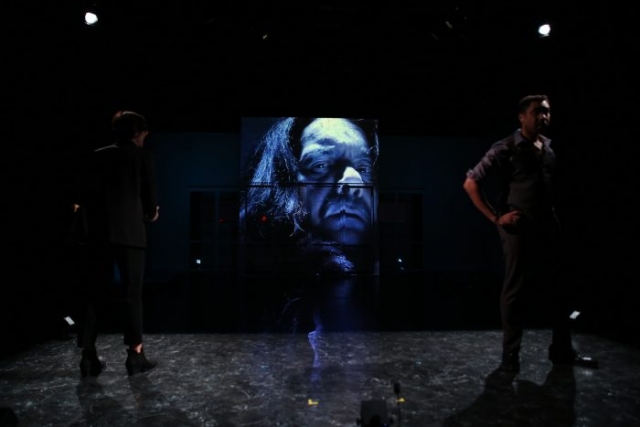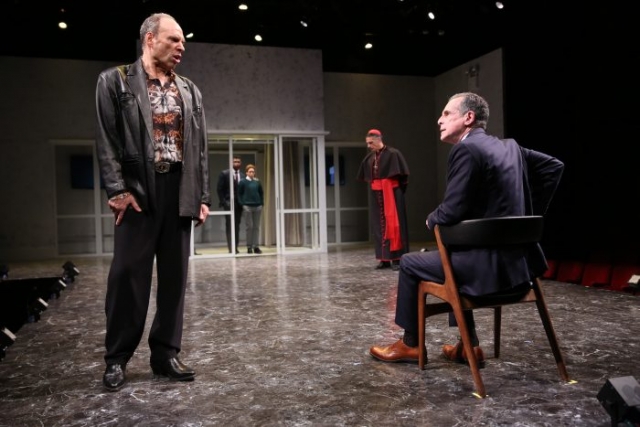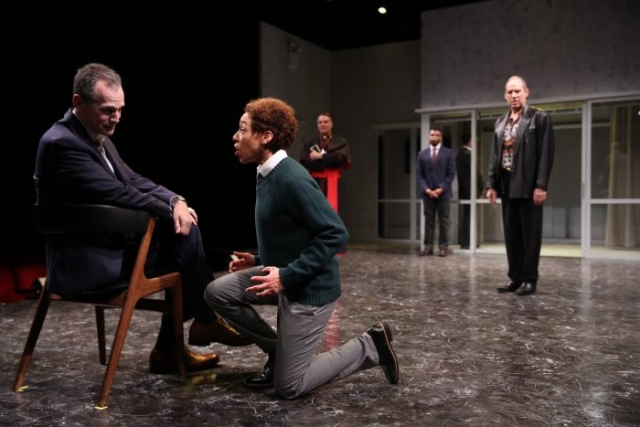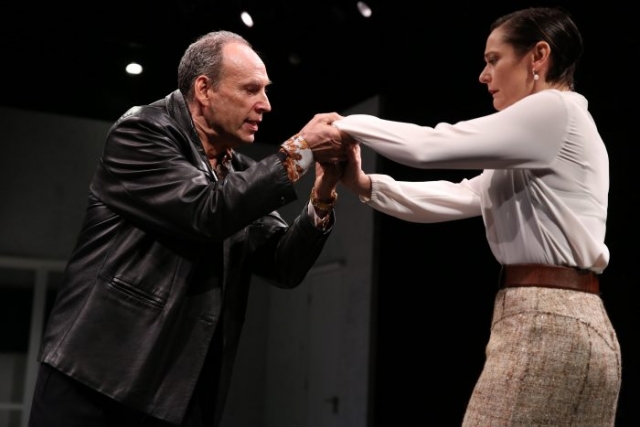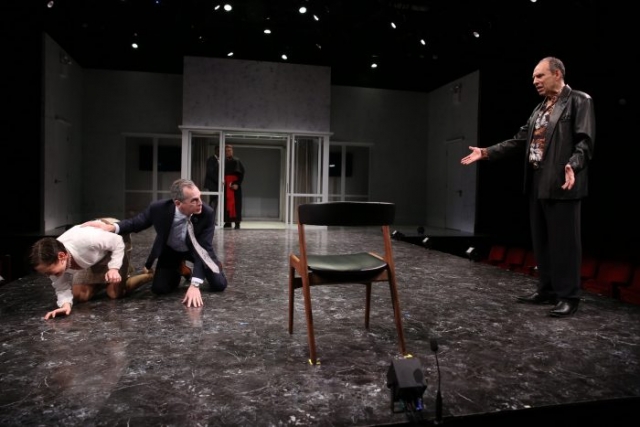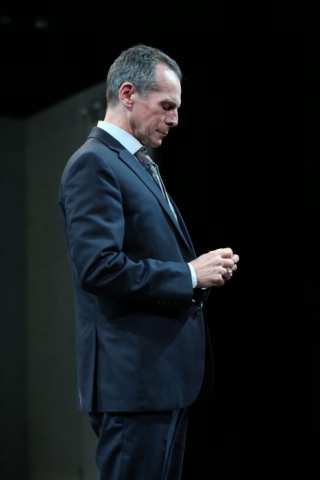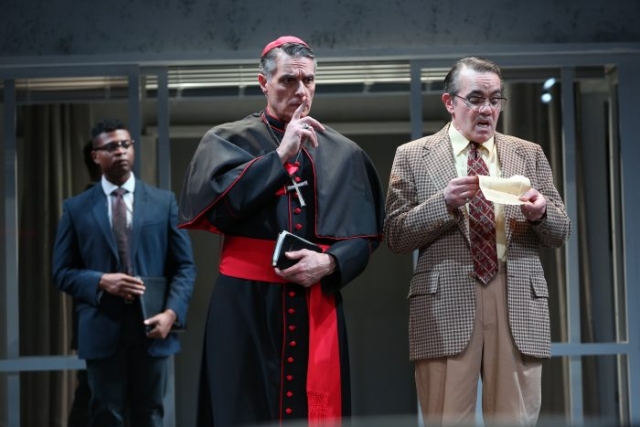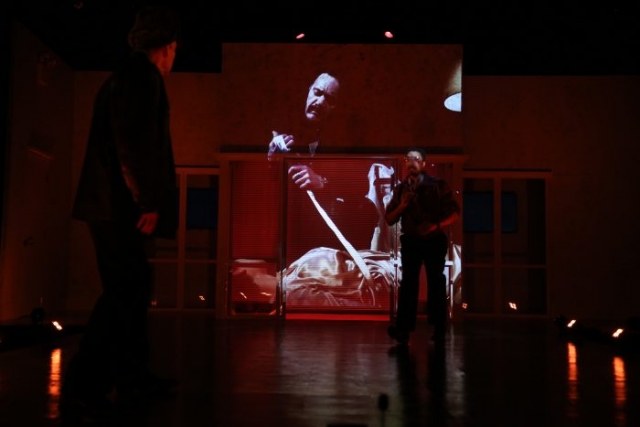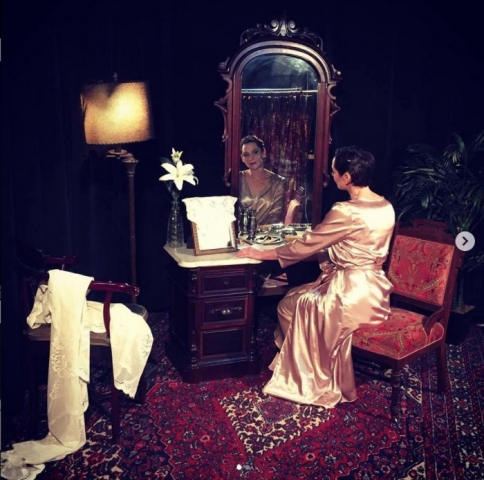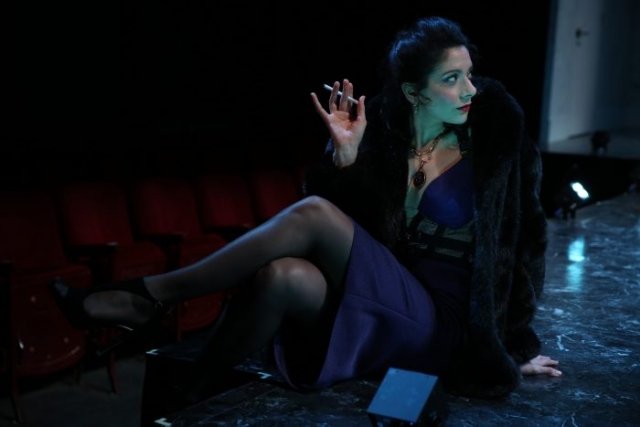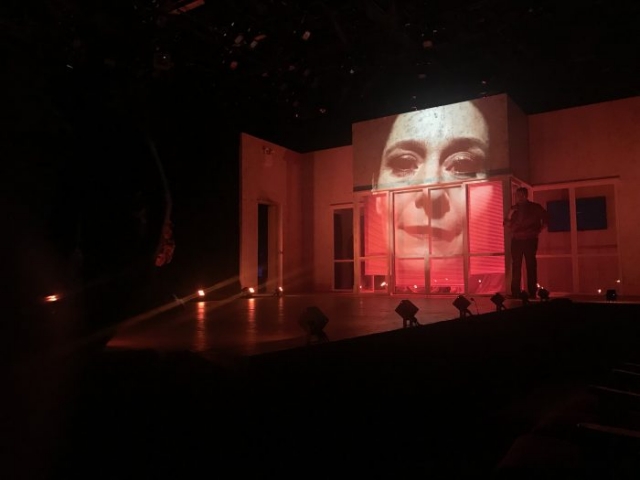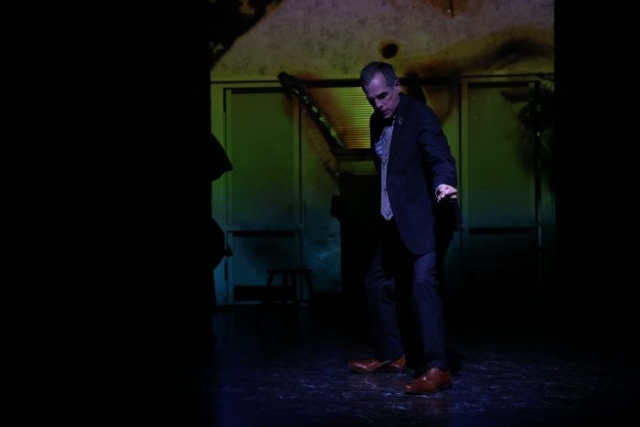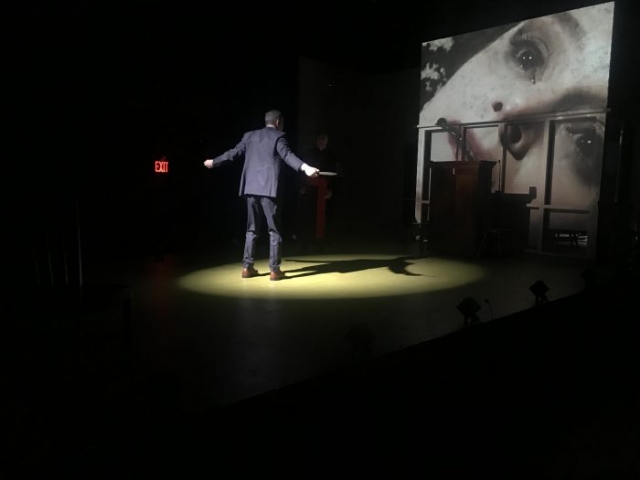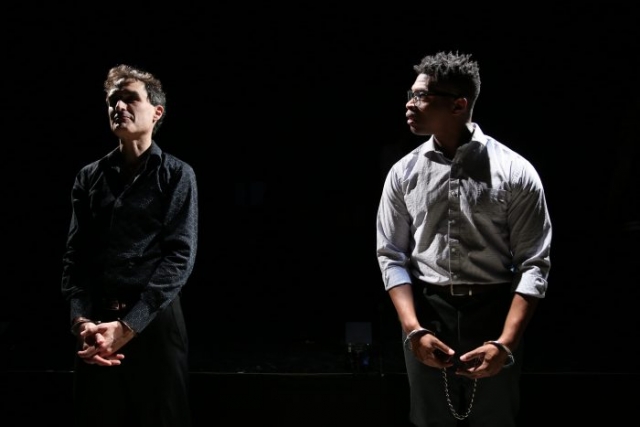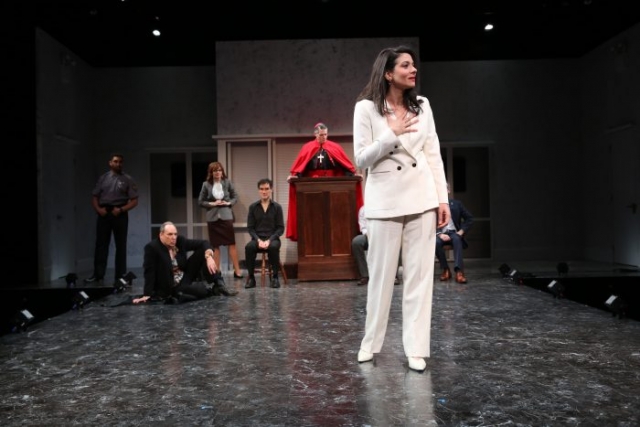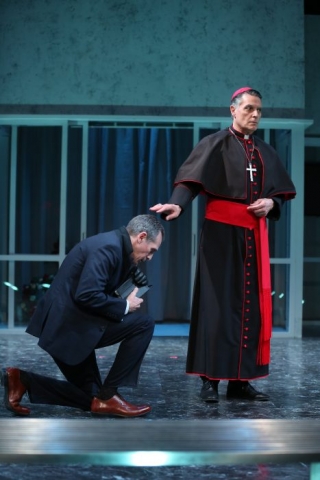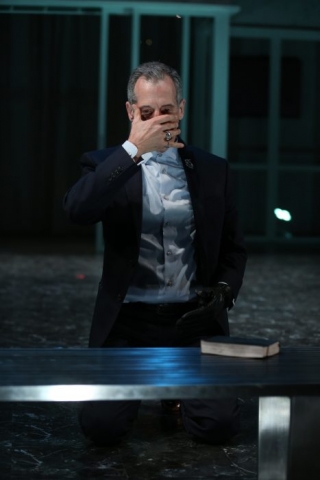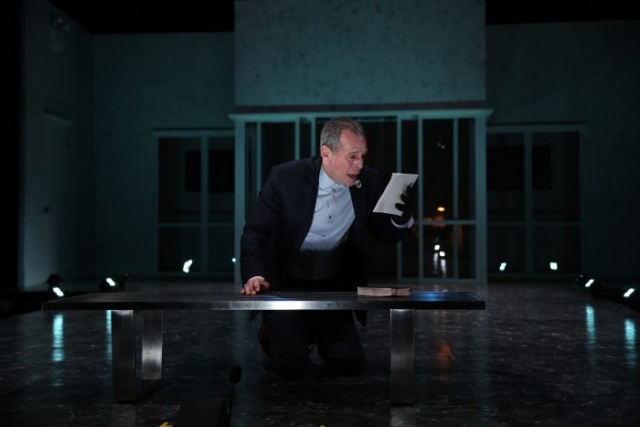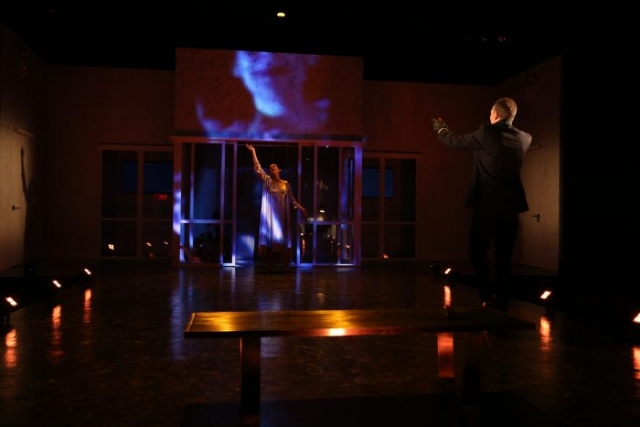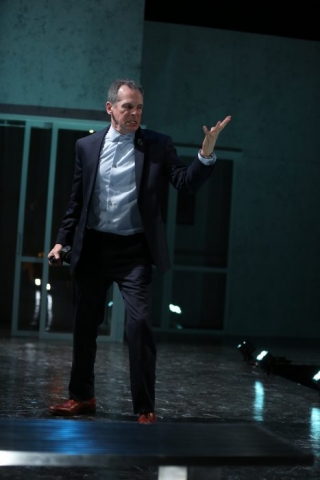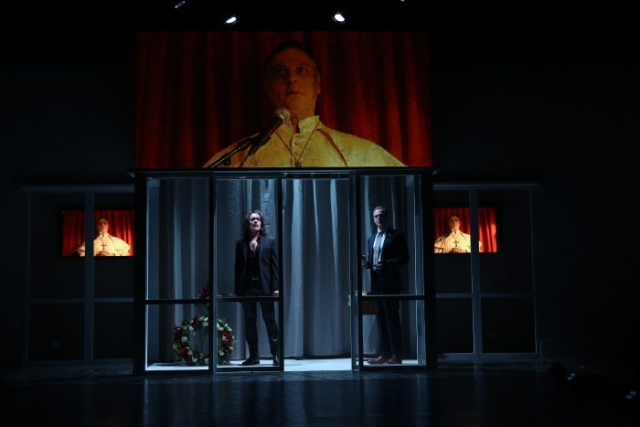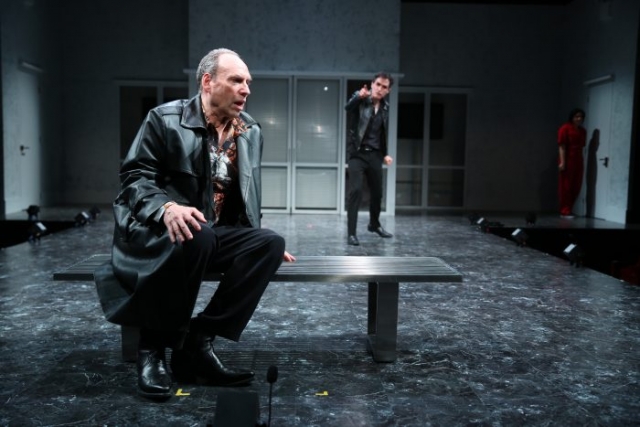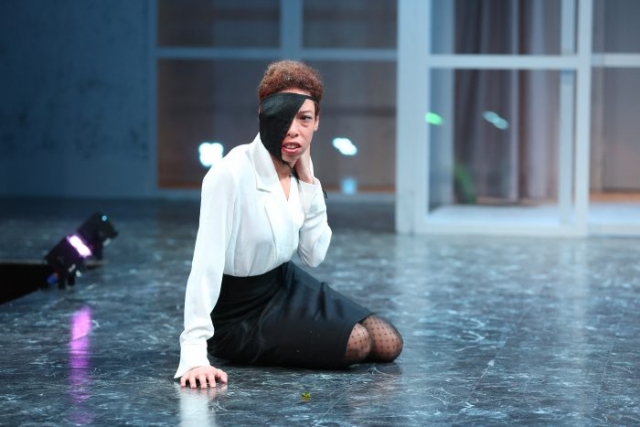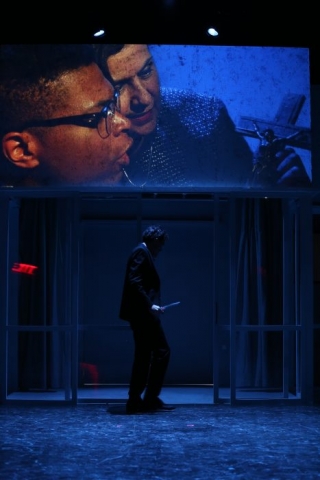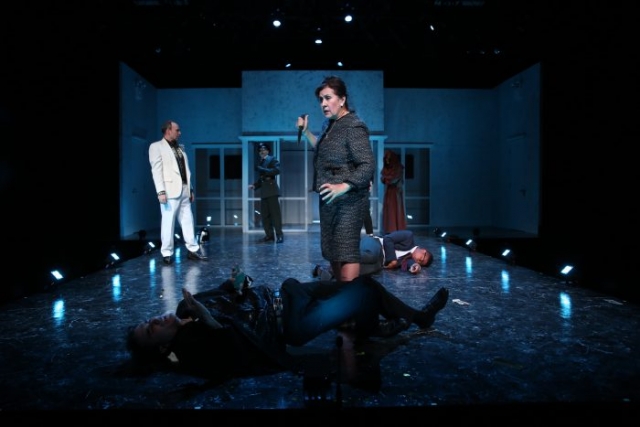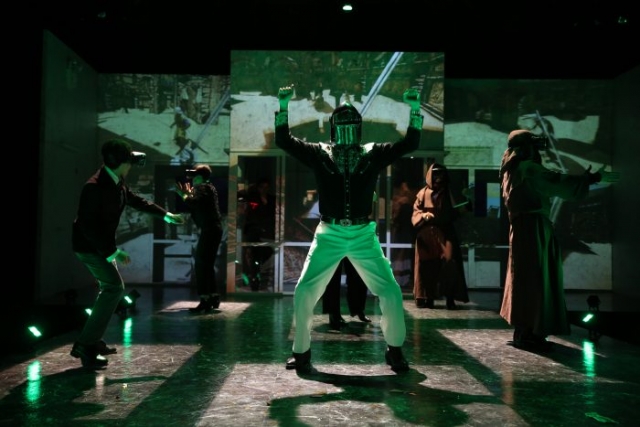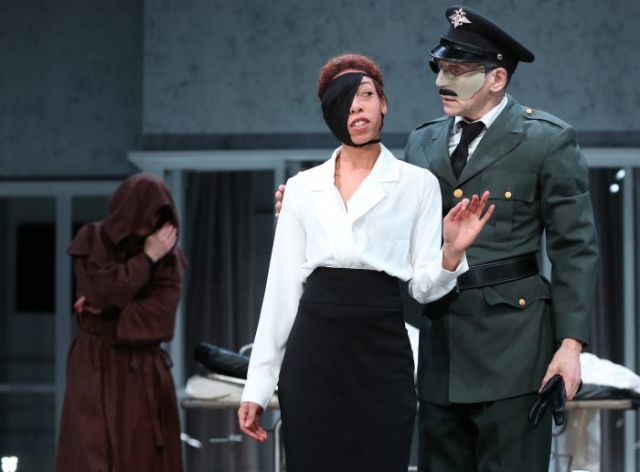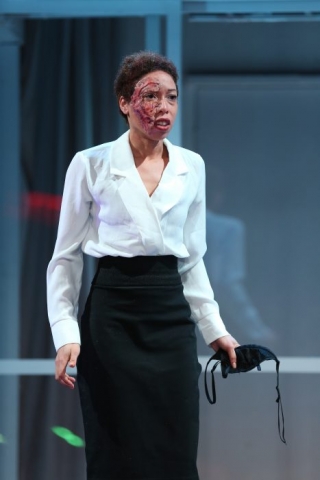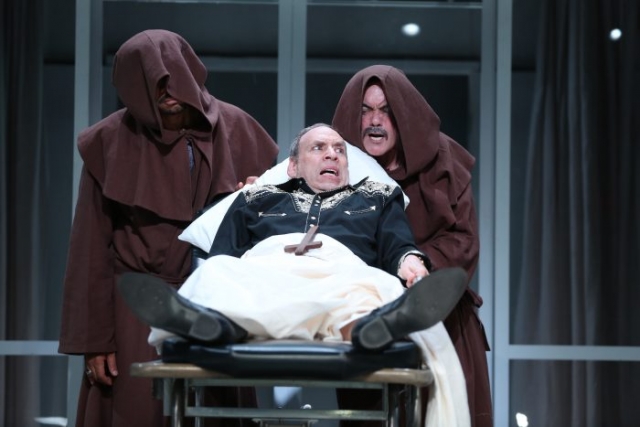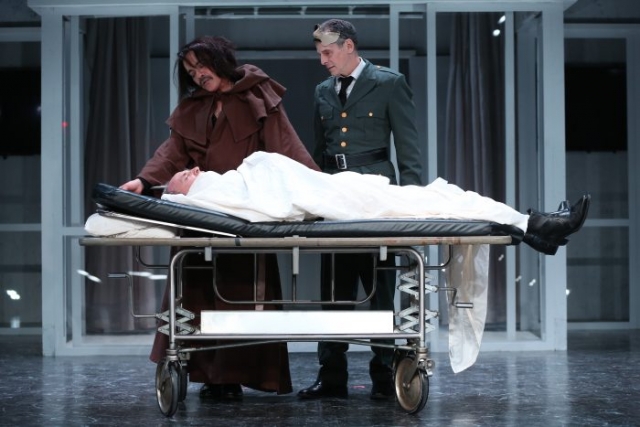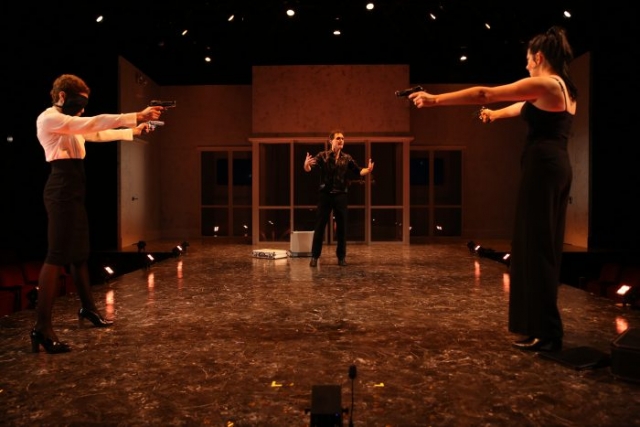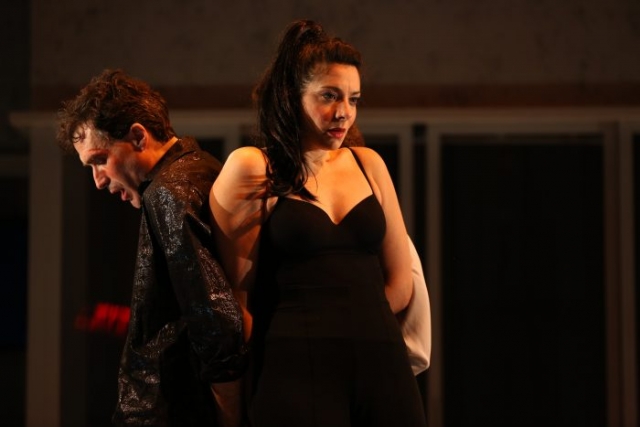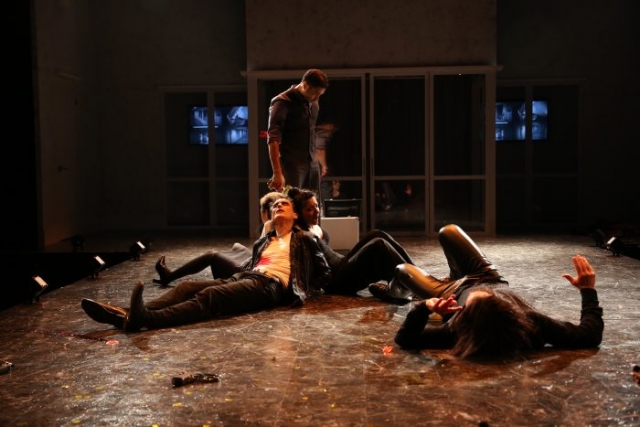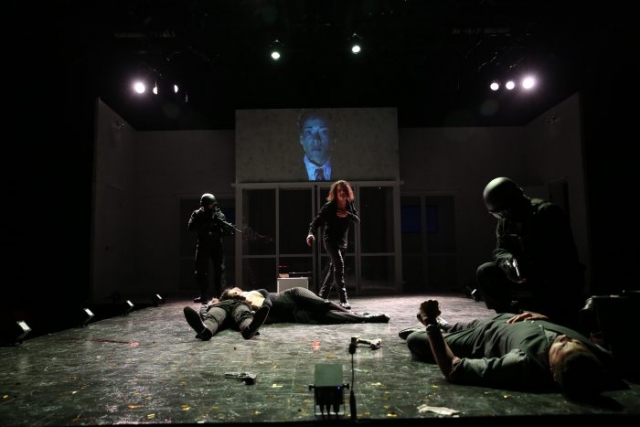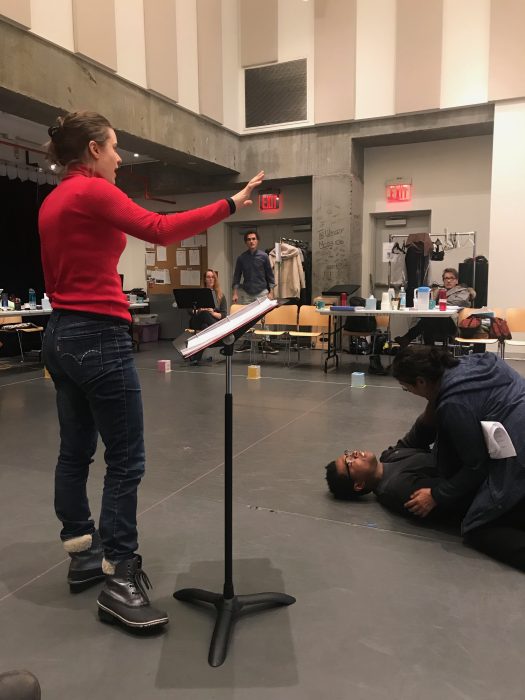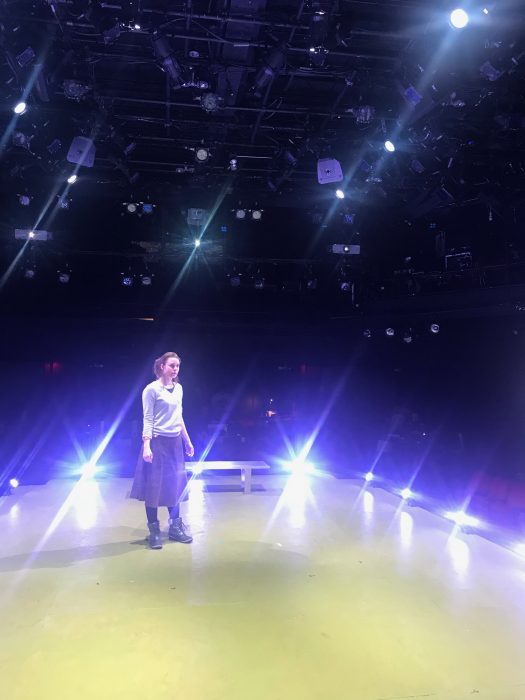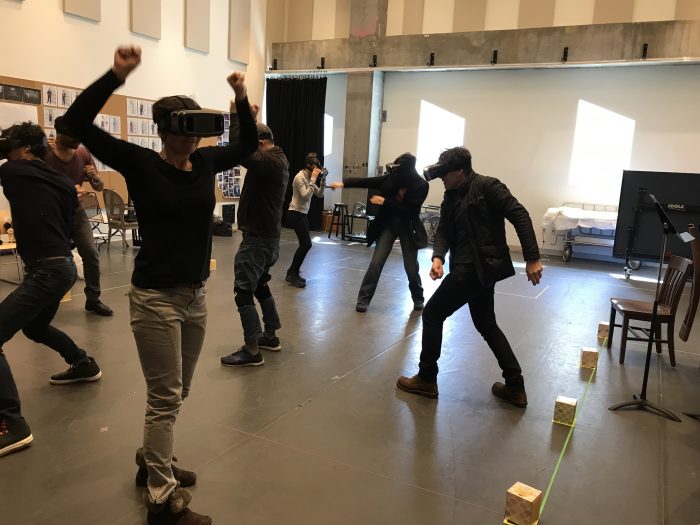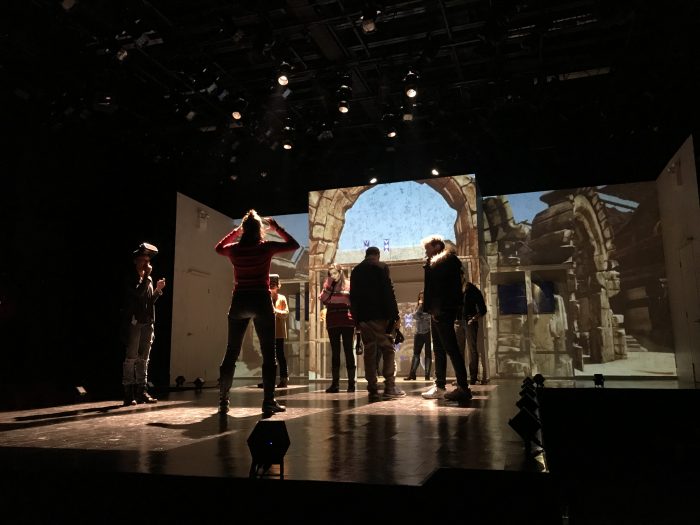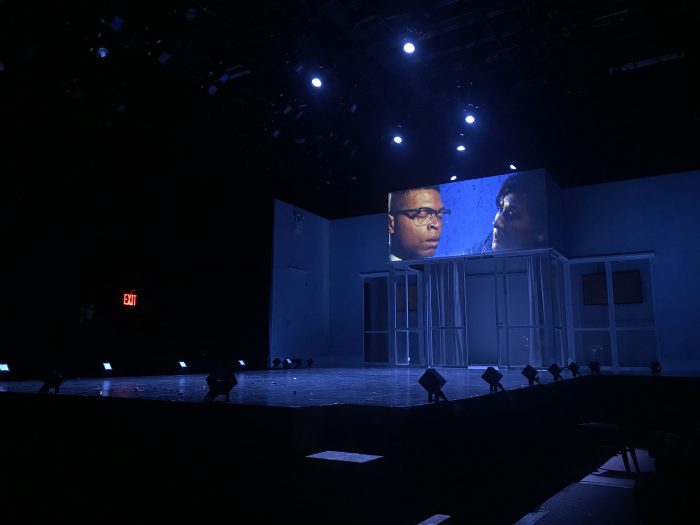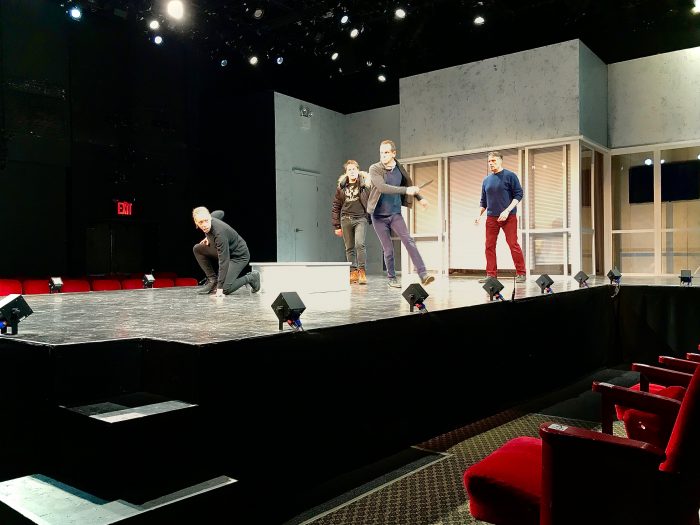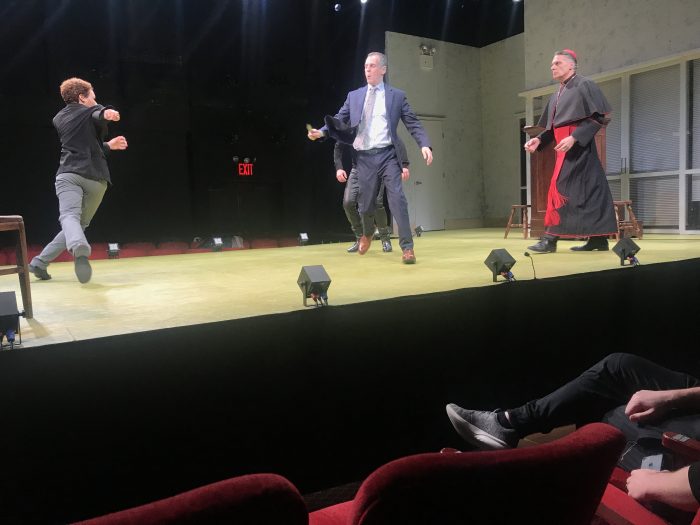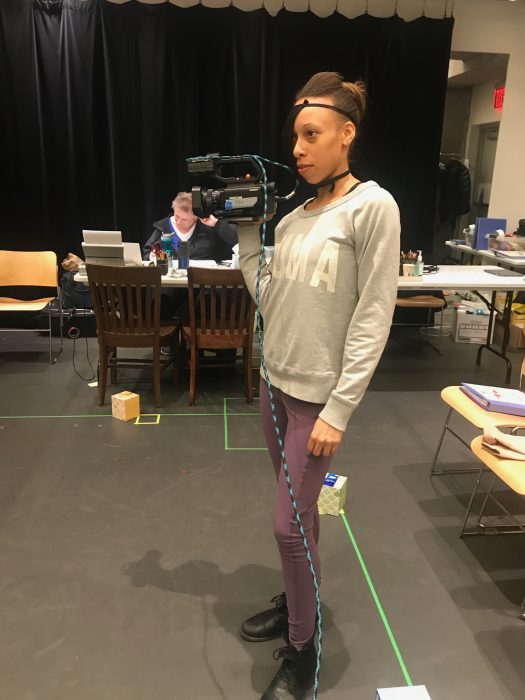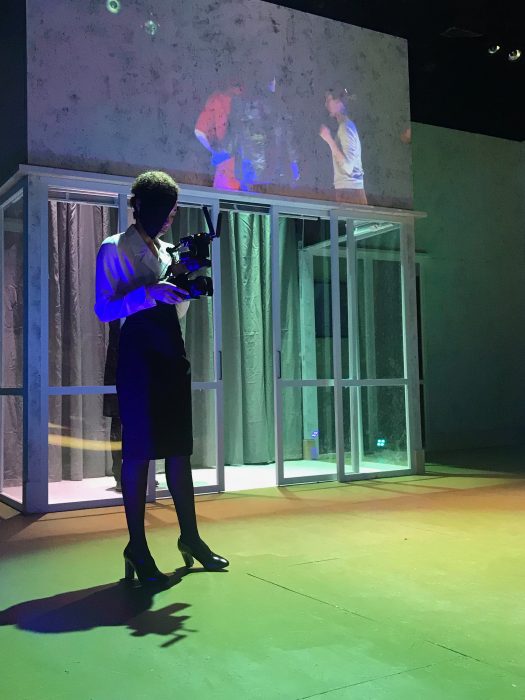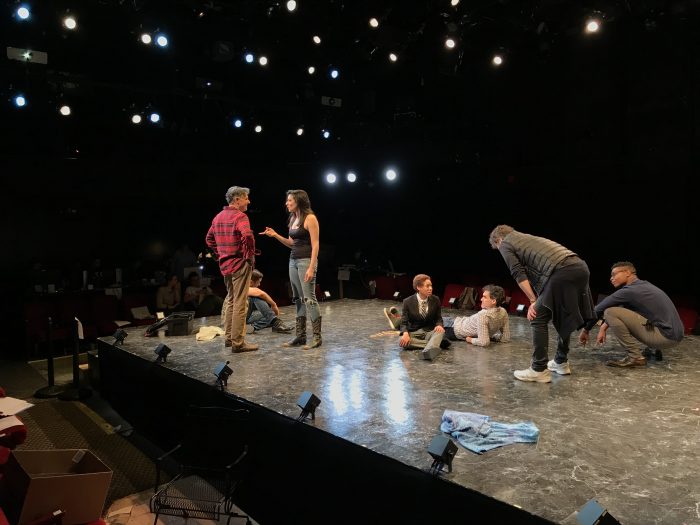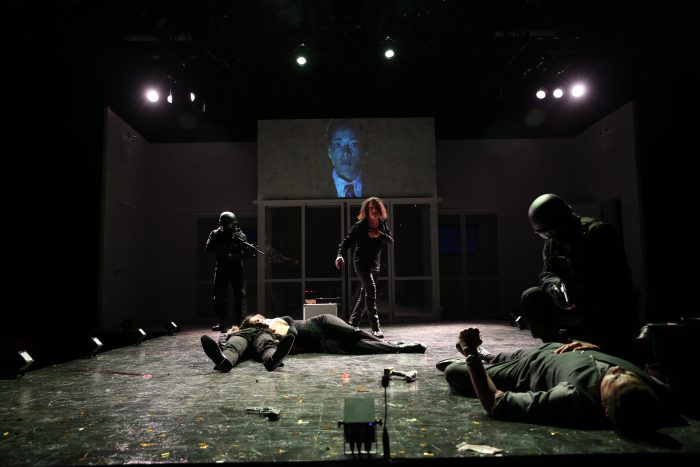
Excerpts from reviews
“In Red Bull Theatre’s rare and wickedly entertaining staging of John Webster’s 1612 comedic tragedy, moral degeneracy rises to the level of high art. . . . Under Louisa Proske’s gratifyingly twisted direction, the work remains a showcase of human vice in its sundry manifestations, from adultery to murder. Even the production’s bizarrely anachronistic flourishes distract little from the play’s timeless relevance as a scorched-earth satire that spares nothing, least of all the self-serving deceptions, hypocrisies, and corruptions of the ruling class.” – David Kortava, The New Yorker
“A smashing new staging . . . Stylishly wicked fun . . . a furious mix of sex, violence, murder, and generally nasty behavior by corrupt elites in high places . . . Expect no moral uplift here. A brew of uncontrollable passions, treachery, and vengeance sprinkled with darkly poetic language . . . the story might be applied to our present amoral times . . . Blazing performances amid bold modern visuals restore The White Devil to lusty life.” – Michael Sommers, New York Stage Review
“Brilliantly re-envisioned for our times . . . With its multi-layered narrative, 20 characters (plus disguises), and unexpected twists and turns, The White Devil isn’t easy . . . Through their clarity of direction, design, and delivery, Proske and company effectively capture the play’s unbridled horrors, along with its keen satiric insight and dark sardonic humor, in keeping with Webster’s telling line, spoken by the vengeful Francisco de Medici, Duke of Florence (well played by T. Ryder Smith): “My tragedy must have some idle mirth in it.” . . . Without exception, Red Bull’s outstanding lead cast masterfully embodies the roles, portraying the emotions, psychology, and motivations of the unsettling figures and their distinctive personalities. – Deb Miller, DCMetro Theatre Arts
Stylish and spry . . . The play bops from one shockaroo to the next, indicting religion, politics and the patriarchy . . . Webster’s verse is a blunt, evocative instrument . . . the figurative language catches the ear like a barbed hook. . . . A couple of the more seasoned actors, like Jenny Bacon, who plays the Duke’s not-long-for-this-world Duchess; T. Ryder Smith who plays her conniving brother; and Derek Smith who plays both Vittoria’s doomed husband and then her murderer, are able to layer three or four big, distinct emotions onto each line, to meet the play’s extravagances with energy and rigor. . . . Nihilism can leave a bitter taste in your mouth, but Webster is such fun to bite into, an invitation to revel in people at their very worst, to taste depravity.” – Alexis Soloski, New York Times
“With themes of infidelity, classism, violence, misogyny, deceit, greed, corruption, a dehumanizing society, religion and familial dysfunction at its core, The White Devil seems like it would read like todays newspaper headings. Instead it is treated like a sketch comedy, drawn more for laughter than theatre.” – Suzanna Bowling. Times Square Chronicles
“A convoluted tale of corruption, betrayal, adultery, marital discord, misogyny, religious hypocrisy, murder, disguise, and the power politics of “great men.” It’s set in Rome and Padua among a cohort of panders, priests, poisoners, spies, sycophants, courtiers, and cuckolds. . . . The biggest devil plaguing this production is the clash between its high-flown rhetorical style and overblown acting with its modern-dress approach. If the intent is to underline the play’s relevance by giving it a nowadays appearance, the acting needs to be more straightforwardly realistic. I’ll resist mentioning the worst offenders but I could count the number of believable moments on one hand. Ultimately, everything turns into melodramatic caricature.” – Joe Lombardi, Theatre Reviews From My Seat
“Relevant and approachable . . . If you like a fast-paced twisted plot-line of sex, poetry and death all in one night, debauchery, jealously, murder, spurting blood and infidelity no matter the consequences all played to a heightened tempo and drum beat, then this may be right up your alley.” – David Walters, New York Theatre Guide
“This production is good enough to make one wish it were just a little bit better. . . . The best thing about Proske’s production is that it lays out Webster’s labyrinthine plot with crystal clarity. Even with a cast full of dissemblers, side-switchers, and killers-for-hire, we always grasp what everyone is up to and where they stand; this is no mean feat . . . But Proske has been unable to settle on a prevailing tone; the action shifts between a fury that really means it and a baroque version of black comedy that seems altogether too easy . . . An associated issue involves the cast’s uneven handling of the play’s verse. Some excel at delivering Webster’s jagged, denunciatory speeches, while others lose the rhythm of the lines, chopping them to diminished effect. . . . T. Ryder Smith’s Francisco de Medici is the most adept and subtle of intriguers . . . ” – David Barbour, Lighting & Sound America
“A sharp, contemporary take on John Webster’s 1612 feast of bloodlust. . . . T. Ryder Smith’s Francisco is an enjoyably self-involved schemer who suggests an incestuous undercurrent in his quest for justice for his sister . . . Happily, though, it is plot, not character, that ultimately drives Webster’s writing, and the crystal-clear, eminently accessible reading of the text, partnered with Proske’s nimble, active staging keeps the audience ever on its toes. The cast locates plenty of the humor, too . . .” Dan Rubins, Theatre is Easy
Rehearsals
Publicity

Full reviews
The New Yorker, David Kortava – In Red Bull Theatre’s rare and wickedly entertaining staging of John Webster’s 1612 comedic tragedy, moral degeneracy rises to the level of high art. The intricately woven plot dramatizes the real-world machinations, a quarter century earlier, that led to the assassination of an Italian noblewoman long trailed by sin and scandal. More than three hundred years later, T. S. Eliot observed that Webster, ever obsessed with death, “saw the skull beneath the skin.” Under Louisa Proske’s gratifyingly twisted direction, the work remains a showcase of human vice in its sundry manifestations, from adultery to murder. Even the production’s bizarrely anachronistic flourishes—weaponized power drills, a musical score of industrial rock and techno—distract little from the play’s timeless relevance as a scorched-earth satire that spares nothing, least of all the self-serving deceptions, hypocrisies, and corruptions of the ruling class. 4.8.19
New York Times, Alexis Soloski – In ‘The White Devil,’ Pick Your Poison. If you find plausible psychology aggravating and a humane outlook just rubs you the wrong way, please meet John Webster. A playwright with a deep devotion to gore, he churned out some of the 17th-century’s most lurid tragedies and there was nothing — books, a helmet, a tennis racket, a fart — that he didn’t long to empoison. (The urchin from “Shakespeare in Love” who liked to torture mice? That’s him.) Red Bull Theater resurrects his 1612 play, “The White Devil” with mischief and raunch and sibling incest and maybe necrophilia, because hey, why not? Anyone expecting Shakespeare might see if the box office does refunds.T.S. Eliot famously credited Webster as showing the skull beneath the skin. The director Louisa Proske’s production shows some skin, too. The set thrusts impudently into the audience and the costumes, by Beth Goldenberg, look like knock-off Versace, appropriate to this sleazy imagined Padua. Here, the Duke of Brachiano (Daniel Oreskes) is infatuated with Vittoria Corombona (Lisa Birnbaum). (“The White Devil” was based on a true story. Like a lot of its characters, that basis is loose.) The snag: They’re both married to other people. The solution: Murder. In a Webster play, murders are like jelly beans. Who can stop at just one? In the play’s first half, Ms. Proske doesn’t seem to have decided how seriously she should take Webster’s mad, bad world. But in the second half, more enjoyable, she seems to have figured out that just because everyone and everything is terrible doesn’t mean we can’t party down. The play bops from one shockaroo to the next, indicting religion, politics and the patriarchy, when it’s not busy with the blood packs. Sometimes the staging is too much — there are some terrible video sequences and then some better ones — but typically it’s stylish and spry. Webster’s verse is a blunt, evocative instrument. Though Ms. Proske could have cut some of the more obscure lines, the figurative language catches the ear like a barbed hook. Characters speak of the “soft down of an insatiable bed,” of poison under “gilded pills,” of playing football with severed heads. If there had been psychoanalysts in 17th-century England, they would have had a field day with this stuff. Certainly the cast has a nice wallow. A couple of the more seasoned actors, like Jenny Bacon, who plays the duke’s not-long-for-this-world duchess; T. Ryder Smith who plays her conniving brother; and Derek Smith who plays both Vittoria’s doomed husband and then her murderer, are able to layer three or four big, distinct emotions onto each line, to meet the play’s extravagances with energy and rigor. Because if the play is incontrovertibly over-the-top, decadent and then some — I mean, the revenge plot even enlists the pope — it has its own complexities. Are the murders meant to condemn immorality or celebrate it? You tell me. And in the character of Vittoria, whom Ms. Birnbaum embodies with vigor and a high ponytail, he has created, with obvious ambivalence, a singular antiheroine. His Vittoria is both a protofeminist who outargues the men around her (“I scorn to hold my life/At yours, or any man’s entreaty, sir”) and a “strumpet,” a “whore” who meets a stabby end, unmourned. Nihilism can leave a bitter taste in your mouth, but Webster is such fun to bite into, an invitation to revel in people at their very worst, to taste depravity. If that depravity leaves you feeling a little dirty, isn’t that the point? As the cardinal says, “Dost thou imagine, thou canst slide on blood,/And not be tainted?” Exactly. 4.1.19
New York Stage Review, Michael Sommers – Stylishly Wicked Fun for Everyone. First-class productions of The White Devil are few and far between in New York—hell, any productions of The White Devil are about as rare as sightings of Bigfoot in Central Park. According to the record books, John Webster’s seething revenge drama of 1612 vintage has never appeared on Broadway, and has been staged only twice by off-Broadway companies.So it is a pleasure to report that Red Bull Theater, the invaluable company which brings very old plays to life, presents a smashing new staging of The White Devil at the Lucille Lortel Theatre.Jacobean revenge drama is not a genre appreciated by everybody, of course. While Hamlet is a revenge play of a lofty poetic order, lesser others are the 1600s equivalent of slasher flicks. Still, anyone who enjoys a furious mix of sex, violence, murder, and generally nasty behavior by corrupt elites in high places is likely to get a kick out of The White Devil, especially when such dirty doings are performed so stylishly as Red Bull’s rendition. The story? Webster’s plotting is intricate, but here’s his initial trail of gunpowder that leads to explosions in Rome and Padua: A powerful nobleman, the married Duke of Brachiano (Daniel Oreskes) begins a torrid affair with the also-married aristocrat Vittoria (Lisa Birnbaum), arranged by her ambitious, possibly incestuous, brother Flamineo (Tommy Schrider). To clear the way for their liaison, Brachiano then has his wife Isabella (Jenny Bacon) and Vittoria’s husband Camillo (Derek Smith) killed off in devious ways, also through Flamineo’s machinations. The dead spouses, however, have influential relatives, namely the Duke of Florence (T. Ryder Smith) and Cardinal Monticelso (Robert Cuccioli), who later is elected Pope. When they smell something rotten, all sorts of turmoil results, among them a rigged trial, excommunication, a prison break, and any number of gory murders. (I lost count after seven homicides.) Expect no moral uplift here. A brew of uncontrollable passions, treachery, and vengeance sprinkled with darkly poetic language—“We think caged birds sing when indeed they cry”—the story might be applied to our present amoral times of Crown Prince Mohammed Bin Salman: “Princes give rewards with their own hands, but death or punishment by the hands of others.” Accordingly, The White Devil is inventively staged with modern accouterments by director Louisa Proske, who does it all up swiftly and smartly. Live video plus several very striking filmed sequences (designed by Yana Birÿkova) are deployed along with insinuating electronic music and sound effects (designed by Chad Raines) to heighten the play’s feverish mood. Set designer Kate Noll builds out a thrust stage deeply into the auditorium to shove the action closer to spectators, some of whom in the front rows were observed to flinch from the occasional spatter. Oh, yes—power drills and similar 2019 implements substitute for the daggers of Webster’s era. (And a murder by way of a poisoned helmet is ingeniously updated for today’s pastimes.) But such trappings might go for naught had not Proske directed a sterling 11-member ensemble so splendidly. This sensational play’s ceaseless shifts in tone between suspense, dark comedy, and horror are challenging to navigate, yet under Proske’s guidance, the actors easily glide over its seismic changes. They also speak the play’s florid language naturally and clearly. Daniel Oreskes, ever a brooding, even menacing, presence as Brachiano, strikes sparks with Lisa Birnbaum’s libidinous, gutsy Vittoria, who defies everyone who threatens her. T. Ryder Smith’s dryly sinister Duke and Tommy Schrider’s sleazy Flamineo contrast against Robert Cuccioli’s low-keyed depiction of the cunning Cardinal. Another kind of contrast is provided by Derek Smith, who appears first in preppy attire as Vittoria’s milquetoast of a doomed husband and then roars back into the story in greasy locks and black leather as the debauched Lodovico, a flamboyant sociopath. The remainder of the company, enabled by Beth Goldenberg’s apt costumes, distinctively portray several characters apiece. Such blazing performances amid bold modern visuals restore The White Devil to lusty life, and while there’s no edifying message to take home, the show delivers a great deal of wicked fun. 4.1.19
DCMetroTheatreArts, Deb Miller – John Webster’s bloody Jacobean revenge tragedy of 1612, filled with infidelity, deceit, greed, and corruption, is brilliantly re-envisioned for our times in Red Bull Theater’s current production of The White Devil, playing a limited engagement at the Lucille Lortel Theatre. The epic narrative, originally based on the actual 1585 murder of Italian noblewoman Vittoria Accoramboni, presents a hellish view of dystopian society and familial dysfunction, with classic lessons about the rampant evils of wealth and power, classism and misogyny, and out-of-control violence that continue to plague civilization to the present day. With its multi-layered narrative, 20 characters (plus disguises), and unexpected twists and turns, The White Devil isn’t easy. To facilitate viewing, the show’s printed program includes a one-page insert with a synopsis, providing a valuable tool for those who aren’t familiar with the play and a useful refresher for those who are. As directed by Louisa Proske, Webster’s complex plot and sub-plots, multitude of figures, and setting in Italy have been retained, as has his rich and expressive 17th-century language. But the production’s design is transplanted to the post-modern era, to underscore the socio-political import and universality of its themes and, in so doing, to reaffirm that classics are classic for a reason.Not only is the message fully comprehensible, but Proske’s blocking in the venue’s intimate space is engaging (moving the actors around and off the thrust stage, through the aisles, and in close proximity to the audience) and her pacing is fluid (aided by the clever use of live-feed and pre-recorded video projections by Yana Birÿkova, for scenes that take place in different rooms and distant locations, thereby eliminating the need for cumbersome changes in Kate Noll’s sleek minimal set). The machinations, intrigue, and collusion between the aristocracy and the church, the characters’ adulterous lust and blind ambition, jealousy, anger, and driving need for retribution continuously unfold, culminating in a growing body count and a portent of what’s to come with the next generation. Through their clarity of direction, design, and delivery, Proske and company effectively capture the play’s unbridled horrors, along with its keen satiric insight and dark sardonic humor, in keeping with Webster’s telling line, spoken by the vengeful Francisco de Medici, Duke of Florence (well played by T. Ryder Smith): “My tragedy must have some idle mirth in it.” The odious conduct and ignoble actions of the characters are, indeed, grimly laughable at times, enhanced by some passages of direct address to the audience that break through the fourth wall, and absurd contemporary references to remote-control devices used to trigger the footlights on stage (lighting by JiYoun Chang, which also includes dramatic white spotlights and devilish red hues that distinguish between reality and ghostly apparitions), automatic weapons, power tools, and gym equipment to effect the countless murders, and ultra-violent movies and virtual-reality video games that have become casual entertainment for both children and adults in our desensitized culture. The more recent tone of the show is reinforced by costumes reminiscent of the disco era (by Beth Goldenberg) and a soundtrack of techno and hard rock music (sound by Chad Raines). Without exception, Red Bull’s outstanding lead cast masterfully embodies the roles, portraying the emotions, psychology, and motivations of the unsettling figures and their distinctive personalities. Robert Cuccioli as the Cardinal Monticelso confirms his status as an award-winning veteran of Broadway, with a superb command of Webster’s sumptuous script and a controlled performance that bespeaks the hidden duplicity and secret aspirations of the hypocritical ecclesiastic. Lisa Birnbaum captivates as Vittoria Corombona, unjustly tried for the murder of her cuckolded husband Camillo (Derek Smith), condemned to a House for Penitent Whores by the Cardinal for an affair with the officious Duke of Brachiano (Daniel Oreskes) that was encouraged by her rapacious and devious brother Flamineo (Tommy Schrider), then scornful and defiant in her own defense, in a time when women had few options other than to be wives, mistresses, or maidservants (the judgment of Vittoria is one of the play’s most compelling scenes). The supporting cast, too, brings the requisite passion and biting satire to its roles. Notable portrayals are turned in by Socorro Santiago as the siblings’ honorable mother Cornelia, outraged by their scandalous conduct and driven mad by the murder of their brother Marcello (Amara James Aja); Cherie Corinne Rice in her dual roles as the servant Zanche and the young Giovanni, son of Brachiano and his doomed wife Isabella (Jenny Bacon); and Edward O’Blenis as the dissembling assassin Gasparo. Red Bull Theater’s stellar production of The White Devil offers a rare opportunity for aficionados of the classics to experience Webster’s infrequently seen work and to recognize in it the harrowing behavior that spans the centuries and defines the worst of humankind. It’s a difficult and disturbing play, but one that is well worth the emotional and intellectual challenges it presents. 3.31.19
Times Square Chronicles, Suzanna Bowling – “Fortune’s a right whore: If she give aught, she deals it in small parcels,That she may take away all at one swoop.” John Webster’s 1612, White Devil at the Lucille Lortel Theatre, is a mix of so many styles, that one has to wonder what it is. From the disco like Versace costumes by Beth Goldenberg (love that purple dress), to horribly made video’s by Lana Birykove (trying to rip off Ivo van Hove), making their home on a slick modern set by Kate Nell, to the Saturday Night Live direction by Louisa Proske, I was beyond confused as to what Red Bull Theater’s normally brilliant endeavors were trying to convey.Much like the Marquis de Sade, Webster’s talk of playing football with severed heads, almost feels like the verse, that incites a riot in Quills. The play also has an obsession with whores and what they are and are like. “You know what whore is. Next the devil adultery, Enters the devil murder.” With theme’s of infidelity, classism, violence, misogyny, deceit, greed, corruption, a dehumanizing society, religion and familial dysfunction at its core, The White Devil seems like it would read like todays newspaper headings. Instead it is treated like a sketch comedy, drawn more for laughter than theatre. The premise is loosely based on the real life of Vittoria Accoramboni (Lisa Birnbaum) an Italian noblewoman. Having been wed to Camillo (Derek Smith), a man of no position, but nephew to Cardinal Monticelso (Robert Cuccioli), soon to become pope. The Duke of Bracciano (Daniel Oreskes), one of the most powerful men in Rome, is in lust with her and she with him. Her brother Flamineo (Tommy Schrider) is trying to arrange for the two to shed their spouses and marry each other. In the meantime Francisco de Medici (T. Ryder Smith), brother to the Duke’s wife Isabella (Jenny Bacon), has brought Cardinal Monticelso to bring the marriage back together. In person. The Duke of Bracciano agrees, but when alone with his wife tells her this will never happen. In one of the most confusing scenes of the whole play, Isabella tells her brother and the Cardinal it is she who does not want to stay married. Despite this Camillo and Isabella are murdered. Though the Duke is suspected of murdering his wife, Vittoria is blamed and imprisoned in a place for women of ill repute. Flamineo and his brother Marcello (Amara James Aja) are accused of killing Camillo, but escape sentencing. Once Vittoria is free the Duke marries her, but Francisco, Monticelso and an Italian Count Lodovico (Smith again) who was in love with Isabella plot and execute revenge, in a scene where most of the people on stage die a gory bloody death. There are over 20 characters including Socorro Santiago as the moralistic mother to Vittoria, Flamineo and Marcello. Cherie Corinne Rice in her dual roles as the servant Zanche and the son of Brachiano, which is highly confusing. Edward O’Blenis plays the assassin Gasparo, a conjurer and a guard. At the heart of the play is Lisa Birnbaum, whose gutsy Vittoria, stands up for what she believes. Daniel Oreskes and Robert Cuccioli, though both are good, seem to have been cast in the others role. T. Ryder Smith is intense and Tommy Schrider seems to over act, as does Socorro Santiago in her numerous roles, though she is rather good as the mother. The roles played by Derek Smith, as Vittoria’s weak and cuckolded husband and then as the sociopathic Lodovico, are quite interesting in their distinctiveness. The White Devil isn’t easy to follow due to Webster’s complex plot and the casting. Add to that the semi modern era of the costumes, set and video played against language that has not been updated, nor cut and the satiric humor in which the show has been directed. We also get automatic weapons, power tools, and gym equipment to pull off the murders. Dramatic lighting by JiYoun Chang and a soundtrack of techno and hard rock music by Chad Raines. “As in this world there are degrees of evils, So in this world there are degrees of devils.” 4.1.19
Theatre Reviews From My Seat, Joe Lombardi – Written by John Webster in 1612, The White Devil belongs to the early modern genre of revenge tragedy. A crime spurs retaliation that inspires further revenge. The original full title is The White Divel; or, The Tragedy of Paolo Giordano Ursini, Duke of Brachiano With The Life and Death of Vittoria Corombona, the famous Venetian Curtisan. The play is based on a true story involving infidelity, religion and murder.The Duke of Brachiano (Daniel Oreskes) is lustily obsessed with Vittoria Corombona (Lisa Birnbaum), the daughter of a noble but impoverished Venetian family. Unfortunately both are married. His wife is Isabella of the de Medici clan. The Duke’s secretary and Vittoria’s brother Flamineo (Tommy Schrider) is the social climber type and wants his sister’s fortunes to rise. He arranges for the clever and creative killings of the two unwanted spouses.Revenge plots emerge and, as might be expected, more murders happen. The juiciest section of this play is when Vittoria is placed on trial. Defiantly proclaiming her innocence, she is dressed head to toe in white, a slap in the face to a society dripping with hypocritical morality. Although there is scant evidence, Cardinal Monticelso (Robert Cuccioli) finds her guilty, sentencing her to a convent for penitent whores. The character of Vittoria is fascinating as an aggressively feminist, outspoken woman. Her scandalous love affair is not a source of embarrassment. Standing trial before a male dominated church and state, she insists that they speak in her native tongue not in Latin. Courageously, she challenges the powerful and unmasks a double standard. Why are her crimes punished when those committed by men are not? The Red Bull Theater specializes in reviving the Jacobean plays of Shakespeare and his contemporaries. ‘Tis Pity She’s A Whore was one of my favorite productions of 2015. Unfortunately, this version of The White Devil frequently missed the mark. The set design alternated between cool and too contemporary. The video projections were effective in showing remote scenes such as banishment or murder. However, the sterile and white lounge area (office?) seemed at odds with the dialogue. Manual opening and closing of curtains or blinds felt like busy distractions. The lighting (Jiyoun Chang) was so bright that any sense of nuance was lost. Director Louisa Proske may have been going for an examination of this play’s themes under a harsh microscope. When a play contains the line “women are more chaste when less restrained of their liberties,” the words speak volumes. I can only guess that the modern décor is meant to underscore a parallel to our current times. I believe I could have easily drawn that line myself. I enjoyed experiencing the play as a fascinating artifact rather than this particular production. The style of acting seemed to be an odd mishmash of formality and looseness. Ms. Birnbaum’s Vittoria definitely reminded me of my Italian relatives who possessed strong backbones and questionable morals. Robert Cuccoli’s Cardinal dripped with sanctimonious venom while wearing a gorgeous outfit (terrific costumes by Beth Goldenberg). As the slinky cad Flamineo, Mr. Schrider nicely embodied the time period with a modern physicality. Derek Smith as Count Lodovico, another revenge obsessed character, was an ideal blend of crazy and committed with a commanding stage presence. I must point out that some audience members did not stay for the second half. A gentleman who sat back down to give it a chance awkwardly walked out a few minutes later. I am a big fan of theater companies that mount older works and I enjoyed experiencing this grand tragedy. The overall production was disappointing though. The material came across as flat and clinical rather than hotheaded and passionate like a holiday gathering of my youth. 4.1.19
Theatre Pizzaz, Samuel L. Leiter – Off-Broadway’s Red Bull Theater (Jesse Berger, artistic director) loves to take risks by staging infrequently seen, even obscure classics (okay, their upcoming Macbeth doesn’t fit that description). Their unconventional productions, highlighting relationships to contemporary concerns, sometimes click, sometimes don’t. With John Webster’s 1612 tragedy, The White Devil, which doesn’t, Red Bull adds to its growing list of Jacobean revivals (including Webster’s The Duchess of Malfi in 2010). However, Webster’s title makes us remember that the road to hell is often paved with good intentions.The White Devil, which—even heavily cut—runs two hours and 20 minutes, and feels it, is a convoluted tale of corruption, betrayal, adultery, marital discord, misogyny, religious hypocrisy, murder, disguise, and the power politics of “great men.” It’s set in Rome and Padua among a cohort of panders, priests, poisoners, spies, sycophants, courtiers, and cuckolds. A true 1586 event, in which a married Italian duke and a courtier’s wife plotted to kill their respective spouses, inspired it. A crude summary might note that Duke Brachiano’s (Daniel Oreskes) faithful wife is Isabella (Jenny Bacon), his gorgeous mistress is Vittoria Corombona (Lisa Birnbaum), and her asinine husband is Camillo (Derek Smith). Assisting in the murders of Isabella and Camillo is Vittoria’s favor-seeking, Machiavellian brother, Flaminio (Tommy Schrider). Vittoria is arrested, and, in the best scene, shows her mettle when tried by the soon-to-be appointed pope, Monticelso (Robert Cuccioli), who banishes her to a home for penitent whores. After she flees, she and Brachiano are excommunicated. Although the script presents Vittoria as being as lascivious as Brachiano, director Louise Proske gilds the lily by having her winking and gesturing to Flaminio to indicate she’s playing a role as part of a scam designed to gull her lover, as if she needed yet another sin on her pretty head. Meanwhile, Isabella’s brother, Francesco de Medici (T. Ryder Smith), Duke of Florence, and his devotees, the debauched Lodovico (Derek Smith) and Gasparo (Edward O’Blenis), take mortally gruesome vengeance on Brachiano, poisoning his helmet’s mouthpiece and strangling him. Flaminio, Vittoria, and Vittoria’s “Moorish” servant, Zanche (Cherie Corinne Rice), participate in a triple suicide plan that has an unexpected outcome before they meet their cruel fates at the hands of Lodovico and Gasparo. Lodovico is slain and Brachiano’s young son, Giovanni (Rice), takes over his father’s dukedom. The White Devil; or the Tragedy of Paolo Giordano Ursini, Duke of Brachiano, With the Life and Death of Vittoria Coronbona, the famous Venetian Curtizan, to give its full title, has had multiple British stagings but only a few in New York. The first was in 1947 at the Equity Library Theatre; the second in 1955 for only one night by the Phoenix Theatre in a “sweater-girl,” gangland-style production, which the same director, Jack Landau, used for a 1965 revival at the old Circle in the Square, with Frank Langella winning an Obie as Flaminio; and a fourth in 2001, at BAM, by Australia’s Sydney Theater Company in what the New York Times called “classic though not period-accurate glamour”; it was advertised as “‘Reservoir Dogs’ Meets ‘The Godfather.’” Proske has gone the modern route (with clothes by Beth Goldenberg), distributed 20 roles among 11 actors, and provided a panoply of the kind of clichéd gimmicks often used to yank Shakespeare and his contemporaries into the present: video projections, helmeted cops in SWAT uniforms, pistols and Uzis, cross-gender casting, knives instead of swords (despite the retention of that word), bodyguards in suits and sunglasses, and so on. The technically proficient video sequences are flashy but most make little sense. Those showing the murders of Isabella (she kisses a poisoned picture) and Camillo—supposedly conjured by a magician for Brachiano’s viewing—are little more than carefully edited movie clips. And Camillo’s murder comes not by a fall from a vaulting-horse, as in Webster (and a program note), but by having a weighted barbell pressed against his neck, requiring some dialogue snipping to justify it. Most of the conventional ingredients of Jacobean blood tragedy play their part. Aside from one or two honest characters, like Isabella or Vittoria’s mother, Cornelia (Socorro Santiago), evil schemes and deeds follow one another from many malefactors. So many, in fact, it becomes impossible to say not only who the central character is but to whom the title points.Designer Kate Noll has, for the first time in my long experience of visiting the Lucille Lortel Theatre, changed its configuration to allow for a deep thrust stage surrounded by seating on three sides. Upstage is a modernistic white wall and glassed-in area, but, regardless of Jiyoun Chang’s many lighting cues, barely any attempt is made to differentiate one locale from another in the episodic play. Webster’s metaphoric language has many gems but can be as difficult to follow as the play’s multiple threads, described by its Australian director in 2001 as “a latticework of intertwining stories that collide.” Thematically pertinent as the play may be, the audience is mainly concerned with figuring out what’s what and who’s who (everyone seems to be someone’s brother, made more confusing by casting African-American actor Amara James Aja as the brother and son of, respectively, a white man and woman). The biggest devil plaguing this production is the clash between its high-flown rhetorical style and overblown acting with its modern-dress approach. If the intent is to underline the play’s relevance by giving it a nowadays appearance, the acting needs to be more straightforwardly realistic. I’ll resist mentioning the worst offenders but I could count the number of believable moments on one hand. Ultimately, everything turns into melodramatic caricature. When the body count and other fustian pile up during a chaotic conclusion bordering on silliness (wait for the electric drills), The White Devil becomes more laughable Jacobean travesty than laudable Jacobean tragedy. And that’s no bull, red or otherwise. 3.31.19
Theatremania, Zachary Stewart – Rich people can afford to do terrible things when they’re in love. That is perhaps the only useful takeaway from John Webster’s The White Devil, now getting an undeniably entertaining but insufficiently outrageous revival from Red Bull Theater at the Lucille Lortel Theatre.The original Red Bull Theatre in London was the site of the play’s uncelebrated 1612 world premiere, so the venue’s American namesake feels like the right troupe to lavish this Jacobean revenge tragedy with the kind of love it never received in its childhood. That love is evident in Louisa Proske’s well-conceived modern-dress production. There are glimmers of the high camp and cheap thrills this script is capable of producing, but not enough. The White Devil is the 17th-century equivalent of a B movie. It’s a postcard from a decadent society that, in retrospect, should have seen that puritan dictatorship coming. Webster sets his play in Italy, a land few of his viewers would have visited, but on which they would have been able to project their anxieties about living in a violent kakistocracy (perhaps in a manner similar to the way contemporary Americans view Russia). The Duke of Brachiano (Daniel Oreskes) is in love with Venetian noblewoman Vittoria Corombona (Lisa Birnbaum), but she is married to Camillo (a nebbishy Derek Smith). Also, Brachiano is married to Isabella de Medici (Jenny Bacon) — yes, those Medicis. After Brachiano and his secretary Flamineo (Tommy Schrider as an ambitious personal assistant) conspire to murder Camillo and Isabella, her brother Francisco (T. Ryder Smith as a somewhat stiff Duke of Florence) plots revenge. More characters add to the intrigue, like Camillo’s uncle, Cardinal Monticelso (an imperious Robert Cuccioli), and Vittoria’s servant Zanche (Cherie Corinne Rice, straight out of a Bond film). As Vittoria’s mother, Cornelia, Socorro Santiago gives a sympathetic performance as the only redeemable character in this play — so naturally, she goes insane and starts handing out flowers in a scene uncannily reminiscent of Ophelia’s mad scene in Hamlet. Webster knew how to write a baddie, but unlike Shakespeare, he leaves us no one to root for. Birnbaum and Oreskes both deliver passionate and grotesque performances as the unlovable lovers at the heart of this tale. Of the cast, Derek Smith (as both Camillo and the debauched Count Lodovico) comes the closest to the kind of heightened portrayal this script calls for, seeming to derive sexual pleasure from revolting acts of violence. Proske’s staging deploys multiple blood packets, but it still feels sparing. The fight direction by Rick and Christian Kelly-Sordelet is sufficient, but not as jaw-droppingly inventive as it could be. Kate Noll has made good use of the thrust stage (an exciting modification of the Lortel), while her upstage structure of glass panels and mini-blinds establishes the contemporary setting from the moment we enter. Jiyoun Chang’s multicolored LED lights lend an element of trash to the proceedings, as do Chad Raines’s melodramatic sound cues. Yana Birÿkova’s video design is super cheesy, often inducing laughs with its cheap horror-film aesthetic. It made me wonder if The White Devil might work better as a movie. Of all the design elements, Beth Goldenberg’s smartly selected costumes offer the most insight into the story: Vittoria’s strappy low-cut dress makes her look like a reality TV housewife that moonlights as a dominatrix, while Brachiano’s flamboyant shirt and leather jacket scream “midlife crisis.” Only one costume directly references contemporary politics: Cuccioli hilariously plays a physician that is a carbon copy of Trump doctor Harold Bornstein), but we’re easily able to recognize all of these awful people as members of the ruling class. A feminist reading of The White Devil would highlight the plight of Vittoria, who is sent to a “house of penitent whores” for her crimes, while her brother and lover escape scot-free (for a time). Webster effectively captures the way women are held to a higher standard than men, but he also shows how it is possible for Vittoria to hide her very bad behavior behind the unequal treatment of her sex. The cry of “misogyny” by powerful and unscrupulous women certainly helps explain the toxic male backlash in our own time, and it might have had something to do with the decay of English society in the half-century following the reign of Elizabeth. 4.1.19
CurtainUp, Gregory Wilson – Mention John Webster to any casual fan of Renaissance drama and they’ll likely think of his great play The Duchess of Malfi—partly because it’s a tragedy the equal of Shakespeare at his best, and partly because of the number of productions it has received over the years. In contrast, Webster’s best-known other tragedy, The White Devil (which preceded The Duchess of Malfi by two years), gets less attention and fewer performances. Both these plays are revenge tragedies, both with strong female characters at their core. Yet Duchess. . . remains far more popular and I was honored to review a spectacular production by Red Bull Theater Company in 2010. If their newest production of The White Devil demonstrates why it’s still not up to its successor, it’s not for lack of trying. The titular White Devil is Vittoria Corombona (Lisa Birnbaum), a beautiful Venetian lady in love with the Duke of Bracciano (Daniel Oreskes) —which would work out well were it not for the unfortunate reality of the lovers’ respective spouses. Bracciano’s wife, Isabella de Medici (Jenny Bacon), is also the sister of Francisco de Medici (T. Ryder Smith), the Great Duke of Florence, which means any obvious move to remove Isabella from the picture could lead to war. But Flamineo (Tommy Schrider), Bracciano’s secretary and Vittoria’s brother, is determined to raise himself to a wealthy station by bringing Bracciano and his sister together at all costs, and so begin a series of events which will end in treachery, violence, and bloodshed…a lot of bloodshed. The Red Bull leans into all of this with gusto. They meld a modern sensibility (techno music, video sequences for the play’s usual dumb shows, even a VR sequence for the courtly tournament towards the end of the play) with full respect for the original language and a classically appropriate thrust stage and discovery space.Director Louisa Proske keeps the action moving swiftly, with generally logical tweaks to the script and a relentless focus on the play’s bloody center. As usual for the Red Bull, the actors more than hold their own, particularly Robert Cuccioli’s Cardinal Monticelso, one of Webster’s typically devious religious figures and Derek Smith’s Count Lodovico—a kind of swaggering, Robert Downey Jr.-esque patron saint of the play’s themes of immorality and vengeance. So far I’ve been pretty positive about the production, and it has a lot going for it. But as the play continues, its cynical amorality and celebration of death and bloodshed begins to wear. Unlike Duchess. . ., there is no figure one can feel good about rooting for, no one to act as a proxy for the audience’s own horror and revulsion at most of the play’s characters. Indeed, this is the one place where I think Proske’s vision falls a little short. The famous scene, where Vittoria is put on trial for murder and ends up being convicted for adultery instead, doesn’t quite have the power it needs. Birnbaum is good but not spectacular, and certain directorial decisions keep us from fully understanding the import of Vittoria’s position, judged by a roomful of hypocritical men. Both that trial scene and the play’s bloody end thus fail to communicate thematic consistency as much as full-throated enjoyment of violence—an enjoyment which modern audiences might no longer share. But in the end, this is more a problem of the play than a production which generally does right by it. I’ve taught Webster for years in revenge tragedy courses, and have always felt The White Devil was partly a dry run for the brilliant Duchess of Malfi. But as this excellent production proves, even an inferior play can create superior engagement, If A Game of Thrones is your kind of series, you’ll find a lot to like about the Red Bull Theater Company’s White Devil.
New York Theatre Guide, David Walters – First performed in the year 1612, The White Devil (or, The Tragedy of Paolo Giordano Ursini, Duke of Brachiano. With The Life and Death of Vittoria Corombona the famous Venetian Courtesan) by John Webster has some relevant things to say even in our day. A story of intrigue, greed, philandering, abuses of power and revenge (which is relevant in almost any time), I was struck by the power of women that this play highlights, wielded in a world constricted and conscripted by men. Seating at the Lucille Lortel Theatre has been reconfigured as a three quarter thrust to bring the players and story closer and out into the audience, moving the plot and ideas from the past into the present. The play is kind of like the subtitle above in parenthesis, lots of characters, lots of things to follow and threads to hang on to, but mainly lots of tragedy and death. T.S. Eliot said that Webster “saw the skull beneath the skin” in each person and this, his first play written solo, highlights that trait. Operatic in its scope, Louisa Proske and her background were brought on as director to helm the turbulent storyline and guide the production through its choppy waters by keeping it clear, focused and succinct. She has done that, making the piece relevant and approachable. I’m not going to give you the synopsis as it would take up all of my allotted word count and you can read the one in the program to follow all the players, just suffice it to say it’s a tangled web of relationships with everyone out for themselves (except Cornelia who is true to her morality, played with motherly conviction by Socorro Santiago). Creative double casting lets several of the actors stretch and chameleon to great effect allowing them to relish in their acting chops (Socorro Santiago as Cornelia, Doctor Julio and Matrona; Jenny Bacon as Hortensio, Isabella and the Lawyer; the all-out hilarious and can’t-take-your-eyes-off-of-him Derek Smith as Lodovico and Camillo; Edward O’Blenis as Gasparo, a Conjurer and Francisco’s Guard; Robert Cuccioli as Monticelso and Physician; Cherie Corinne Rice wonderfully age and gender bouncing as Zanchie and Giovanni). The production is produced by Red Bull Theater, founded in 2003, whose goal is to present classical plays that are rarely done but that still have relevance today that can still touch an audience with stories told with a heightened language of a previous time. It’s a courageous endeavor that they are succeeding at and one I recommend you participate in as a theatergoer who relishes the live visceral experience. I was happy to be able to see their rendition of The White Devil presented with such surety and strength. The play has not been seen in New York since Frank Langella won an Obie for his role in a production that Circle in the Square put up in 1965. This production will not be for everyone though. If you’d rather something safe that entertains and doesn’t challenge your audience skills (and I’m not condemning that at all), then this may not be the evening for you. If you like a fast paced twisted plot line of sex, poetry and death all in one night, debauchery, jealously, murder, spurting blood and infidelity no matter the consequences all played to a heightened tempo and drum beat, then this may be right up your alley. 4.1.19
Lighting & Sound America, David Barbour – The knives come out along with guns, power drills, and various baroque forms of poisoning, in Louisa Proske’s production of John Webster’s Jacobean shocker. Webster was a wild one, spinning elaborate intrigues and revenge plots with such undisguised glee that one imagines if he were alive today he would be snapped up for the writer’s room at, say, Russian Doll or Black Mirror. There is also something astonishingly contemporary about his unsavory cast of characters, few of whom resist the urge to give in to his or her worst impulses. We rarely get a look at The White Devil or The Duchess of Malfi, Webster’s other key work — the last major production of The White Devil was nearly forty years ago, and with a cast that included Harriet Harris and Lisa Banes, it must have been something to see — and thanks are due to Red Bull Theater for its dedication to this underserved era of theatre history. This one is a mixed blessing, however: Until it gives in to laughable displays of cinematic violence, this production is good enough to make one wish it were just a little bit better.I can’t really give a full synopsis of The White Devil. Well, I could, but you’d be scratching your head, and that’s if you didn’t get the vapors. Let’s just say the action begins with the Duke of Brachiano, to whom moral scruples are unknown, falling for the married Vittoria Corombona, who bears a certain resemblance to the femmes fatales of twentieth-century noir fiction: Arguably the play’s most fascinating figure, she alternates between the roles of victim and predator with alarming ease. This illicit attachment leads to the elimination of both Brachiano’s and Vittoria’s spouses — Isabella and Camillo, respectively — setting in motion a series of interlocking revenge plots that leave the cast of characters considerably thinned out by the final curtain. It’s typical of Webster’s savage, coruscating style that one of the principal players in these deadly games is Monticelso, a Roman Catholic cardinal, who, in the course of the action, is elected pope. And you thought today’s Vatican has problems! The best thing about Proske’s production is that it lays out Webster’s labyrinthine plot with crystal clarity. Even with a cast full of dissemblers, side-switchers, and killers-for-hire, we always grasp what everyone is up to and where they stand; this is no mean feat — and, in many scenes, the characters seize on their arias, delivering them with relish and malice aforethought. When Jenny Bacon, as the wronged Isabella, having learned of Brachiano’s infidelity, stages a semi-public breakdown, seeking maximum embarrassment for her husband, or when Robert Cuccioli, as Monticelso, weaponizing his words, calls Vittoria a whore, adding a scalding definition (“They are first/Sweetmeats which rot the eater; in man’s nostrils/Poison’d perfumes. They are cozening alchemy;/Shipwrecks in calmest weather”), you feel the burn. If the entire production was played at this level, The White Devil would be a major achievement.But Proske has been unable to settle on a prevailing tone; the action shifts between a fury that really means it and a baroque version of black comedy that seems altogether too easy, as if everyone involved is saying, Isn’t this a camp? Rather than focusing on the premeditated evil that lurks under the words, the director allows some in the cast to overemote, especially Tommy Schrider as Flamineo, who stops at nothing, including fratricide, in his efforts at shopping Vittoria, his sister, to Brachiano. Similarly, Lisa Birnbaum, as Vittoria, never seems to make up her mind about her supremely opportunistic character, offering a new attitude for each appearance. And Proske can’t decide if The White Devil is sufficiently gripping on its own terms or if it needs extra-bloody flourishes à la Brian De Palma or Quentin Tarantino. If the cast really got at the ugliness embedded in the text, they wouldn’t need such unconvincing bits as a triple murder via power drill, which sends blood spattering in all directions. As it is, one wonders why Proske and Red Bull artistic director Jesse Berger felt that the time was ripe for a revival of this knotty work. With its cast of scheming, hypocritical aristocrats; an ambitious, power-seeking female protagonist; and an element of church corruption, it would seem to invite many interpretations. But staged on Kate Noll’s oddly neutral set, which may remind one of a conference room in a second-rate hotel or an office in a strip mall, it is surprisingly lacking in a mordant point of view. An associated issue involves the cast’s uneven handling of the play’s verse. Some excel at delivering Webster’s jagged, denunciatory speeches, while others lose the rhythm of the lines, chopping them to diminished effect. This happens even in the case of individual performers handling multiple roles. If Bacon impresses as Isabella, she is less at ease as Hortensio, one of Brachiano’s aides, and she mugs ferociously as the lawyer who mounts the case against Vittoria. Schrider rarely gets full value out of the verse either, a pity given his pivotal role in the action. Fortunately, Derek Smith is appropriately frigid as the piratical Count Lodovico, who, escaping exile for his scandalous ways, joins the company of revengers. (He also appears as Vittoria’s reluctant husband, Camillo, here rather unimaginatively portrayed as a closet case in a pink sweater, hugging his pillow like Linus with his security blanket.) Daniel Oreskes nails Brachiano’s concupiscence and amorality, making him the driving force of the plot. Socorro Santiago effectively rains down curses as Cornelia, mother of Vittoria and Flamineo. T. Ryder Smith’s Francisco de Medici — another Isabella sibling — is the most adept and subtle of intriguers. Cuccioli, best known for his musical theatre roles but the possessor of a solid classical technique, is imposing as Monticelso, whose hatred for Vittoria is a fearsome thing. Cherie Corrine Rice, a new face, offers an impressive double turn as Giovanni, the unlucky son of Brachiano and Isabella, and as Zanche, Vittoria’s servant, described in the script as a Moor and here sporting a black half-mask that conceals a massive facial scar, like the Phantom of the Opera. Jiyoun Chang’s lighting provides a variety of looks, including a chilling blue wash, a softer lavender wash with key light for the actors’ faces, and an intentionally vulgar chase sequence filled with saturated colors for a wedding so corrupt that it cries out to heaven. Beth Goldenberg’s costumes are fluently done, but one wonders what the point is of presenting Brachiano and Flamineo as made men with leather jackets and loud shirts, and Vittoria as one of the Real Housewives of New Jersey, with plunging décolletage, short mink coat, and high heels that send a message — and a not a spiritual one. These choices seem arbitrary at best, since everyone else seems to be a politician trailed by staffers and security guards. The video design, by Yana Birÿkova, sensibly and effectively fills in some of the script’s shorter, but still important, scenes; she also delivers the sequence in which — via dumb show, according to the script — Brachiano previews the murders of Isabella and Camillo, rendered in highly contrasting styles. Chad Raines provides underscoring for both deaths, along with music that runs the gamut from Hollywood Strings to EDM; he also handles the sound effects. (I wish he had done something about the scenes of gunplay, which are undermined by the underwhelming pop of cap pistols.) Whatever this production’s fascinations, it runs out of steam in the last half hour, neutering some of its most ferocious scenes through overkill. The White Devil is surely a play with much to say to us today, but it requires more overall discipline and a coherent vision if it is to work to full effect. This one will largely be of interest to scholars of the period and those with an affection for the gore and furious poetry of the Jacobean stage, a yearning not rarely addressed in our theatre. 4.2.19
OffOffOnline, Edward Karam – The Red Bull Theater, founded in 2003 to focus on Jacobean drama (those English playwrights who were overshadowed by Shakespeare) has in recent seasons been incorporating non-Jacobean plays into its offerings, so it’s a pleasure to see the company back on home ground with John Webster’s potboiler The White Devil. Webster is best known for The Duchess of Malfi, perhaps the greatest non-Shakespearean play of the period; The White Devil’s complex plot is inspired by the same Italian family.It consists of two brothers and a sister. One brother is Cardinal Monticelso (Robert Cuccioli); the other is Francisco de Medici (T. Ryder Smith). Their sister, a duchess, is married to the Duke of Brachiano (Daniel Oreskes), a profligate nobleman no longer interested in his wife’s virtue; he is intent on having an affair with Vittoria Corombona, a renowned beauty, but one from an impoverished family. Vittoria herself is one of three siblings. Her brother Flamineo (Tommy Schrider) strives to be a fixer and chafes at the decency inculcated into them and their brother Marcello by their mother, Cornelia (Socorro Santiago). Vittoria is married to a dunderhead named Camillo (Derek Smith), but Flamineo wants to marry her off to the well-heeled Brachiano to ensure a comfortable future for both of them. Neither is uncomfortable with the notion that Camillo may need to die first. Hovering outside the main action in the first half is Count Lodovico (Smith again), a nobleman banished by the Pope, yet his first appearance heralds the high quality of Louisa Proske’s production: she takes the risk of setting the play in the modern era, but she does it shrewdly. In the first scene Lodovico speaks to his supporters via FaceTime, acknowledging the killings he has been banished for, and terming them “fleabitings.” It’s a hallmark of the period that threats of violence are commonplace; they’re spoken aloud and acted on. In a fury at Vittoria, Brachiano declares, “I’ll cut her into atomies,/And let th’irregular north wind sweep her up. …” He even goes so far as to threaten the Cardinal: “Sirrah priest, I’ll talk with you hereafter. Do you hear? The sword you frame of such an excellent temper, I’ll sheath in your own bowels….” But grotesque humor courses throughout Webster’s play, too. The Cardinal keeps a “black book,” he confesses to Francisco. “In it lurk/The names of many devils,” he says, mentioning panders, pirates and lawyers, then adding: “And some divines you might find folded there,/But that I slip them o’er for conscience’ sake.” If that couplet resonates in modern consciousness as a reference to church cover-ups, so be it. Indeed, much in The White Devil is familiar: unscrupulous politicians, spoiled children, and Vittoria herself, a woman who becomes a scapegoat for lust when men aren’t held to the same standard. Other rococo twists are laughable—but who wouldn’t be tickled by the idea of a quack doctor who is able to devise a potion that, when drunk, will emit poisonous farts? Jacobean verse is more jagged and difficult to master than Shakespeare’s, yet the cast in Proske’s production is uniformly in control. They speak the words clearly, and make them comprehensible. Although the plot remains an unwieldy element, a bit of extra attention is worth the effort. Among the standouts are Cuccioli’s imposing Cardinal, who delivers a terrific speech decrying prostitution: “What are whores! Cold Russian winters, that appear so barren, As if that nature had forgot the spring…. They are worse, Worse than dead bodies which are begg’d at gallows, And wrought upon by surgeons, to teach man Wherein he is imperfect.” T. Ryder Smith is a smooth, icy Francisco, while Derek Smith excels both as the finicky sad sack Camillo, who carries a pillow around, and the shaggy, ruthless Lodovico. Socorro Santiago is a forceful Cornelia, and Lisa Birnbaum as Vittoria Corombona is by turns ferocious and sympathetic, sinned against and sinning. Her trial scene is especially effective as she calls out Monticelso for persecuting her. Cheri Corinne Rice smoothly navigates both Zanche, a gypsy waiting woman, and the young princeling, son of the duchess, while Tommy Schrider is irredeemably callow as Flamineo. Kate Noll’s glass-walled set works in tandem with videos by Yana Birÿkova, who incorporates the dumb shows of the period into projections of offstage action. Jiyoun Chang’s creepy lighting adds an unsettled feeling as the bloodletting sets in. Jacobean drama can be convoluted, but this is a chance to see it done well. 4.2.19
The Reviews Hub, Solace – Murder, Mayhem, and Fun! This is John Webster’s The White Devil, currently running at the Lucille Lortel Theatre in New York’s West Village. Webster, who wrote his plays in the 17th century, usually collaborated with others; however, scholars believe The White Devil was the first play he wrote by himself.The White Devil is a tale that surfaces man’s ultimate lust for money, power, and…sex. Watching this hilarious cacophony unravel, under Louisa Proske’s superb direction, one may feel as though they are witnessing the lasciviousness of Caligula, meshed with the suspense of an Albert Hitchcock narrative. And Webster does not skimp on the backstabbing, church corruption, or infidelity. This is a revenge tragedy, in which crime spurs further revenge.Stuart Howard’s laudable casting reflects diversity in gender, race, and age-which is refreshing to see in this piece, which was written in 1612. Standouts from the cast are Derek Smith as Lodovico, Cherie Corrine Rice as Giovanni and Zanche, and Jenny Bacon as Hortensio, Isabella, and a lawyer. Their comedic timing and zeal never ceases. Kudos to the cast for keeping the energy up for the entire two hours and twenty minutes of non-stop action and dialogue (there is a 10-minute intermission). Proske masterfully pulls off keeping the pace of the story fluid and interesting, including having actors break the fourth wall and allowing the dialogue to overlap. The solidness of this production is due in part to Kate Noll’s scenic design, Beth Goldenberg’s costume selection, and Leah J. Loukas’s hair and make-up choices. The White Devil is a fun and entertaining revamping of a classic play that deserves large audiences.
Theatre is Easy, Dan Rubins – A sharp, contemporary take on John Webster’s 1612 feast of bloodlust. There’s no question John Webster knew his Shakespeare. Not only did Webster give Shakespeare a shout-out in the introduction to the first edition of his play The White Devil (written at the end of Shakespeare’s lifetime), but he also borrowed from Ophelia’s mad scene verbatim: “There’s rosemary for you; and rue for you,” a traumatized woman says late in the play, passing possibly imaginary flowers to the folks nearby.But Webster, as shown in The White Devil and then in his most famous play The Duchess of Malfi, only really tipped his hat in Shakespeare’s direction as he charted his own course. When one of The White Devil’s miscreants brainstorms the perfect murder, it sounds like Webster’s individuating battle cry: “O, my lord, I would have our plot be ingenious, and have it hereafter recorded for example, rather than borrow example.” Webster’s own course, as seen in Red Bull’s pretty wicked and pretty satisfying new production of The White Devil, was all about the seamy, steamy underside of the early modern imagination. When the knotty, nasty plot of The White Devil kicks off, Vittoria (Lisa Birnbaum) and the Duke of Brachiano (Daniel Oreskes) have been having some extramarital fun together, with the assistance of Vittoria’s weasley brother Flamineo (Tommy Schrider), who stage manages their trysts. Sex isn’t the only thing that Flamineo excels at facilitating: before long—skip the rest of this paragraph to avoid some early spoilers—he has helped bump off the lovers’ respective spouses, too. Brachiano’s brother-in-law Francisco (T. Ryder Smith) and Francisco’s pal, future Pope Monticelso (Robert Cuccioli), are none too happy with this turn of events and—classic Webster!—seek grisly revenge. I’ve seen one production of The White Devil before, a candlelit noir adventure at Shakespeare’s Globe in London that often snuffed out those candles in favor of pitch blackness. No such darkness here, at least not literally speaking: Louisa Proske, principally an opera director here tackling one of the more operatic of early modern dramas, wants you to see every last spurt of blood. And, oh boy, does it spurt. It would ruin Proske’s most queasily delightful surprise to say more about the gore, but the final massacre is the piece de resistance of a series of modernizing choices that mainly work well (with contemporary sets and costumes by, respectively, Kate Noll and Beth Goldenberg). The exiled Count Lodovico (played with charming immorality by Derek Smith) checks in with Rome over video chat. A poisoned helmet appears here as a poisoned pair of virtual reality goggles. Security camera footage seems omnipresent, reminding us that eyes and ears are everywhere and anyone could betray anyone else at any time. (The snazzy video design is by Yana Birÿkova.) Only in the technological flattening of The White Devil’s magical element, a conjuror who summons up mirages of offstage death scenes, does the modernization lose step with Webster. The speed with which seemingly principal characters get offed allows for ample double casting. Smith steals the show in that regard—I didn’t realize until afterwards that he plays both the slimy Lodovico and the surprisingly sympathetic Camillo, Vittoria’s guileless husband. Cherie Corinne Rice also pivots impressively between the pre-adolescent Giovanni and the sensually sinister servant Zanche. As Cornelia, Vittoria and Flamineo’s righteous, rightfully frustrated mother, Socorro Santiago goes to town, chewing out the siblings for their depravity. T. Ryder Smith’s Francisco is an enjoyably self-involved schemer who suggests an incestuous undercurrent in his quest for justice for his sister, and Schrider’s Flamineo is a wry, impulsive bad-boy, engined by his own passion for turning his family’s fortunes into a series of plot twists. But The White Devil rises and falls on its anti-heroine Vittoria, and this production never quite centers Vittoria’s story. From the beginning, Birnbaum’s Vittoria and Oreskes’ Brachiano feel like the sort of socialite and mob boss pairing that could absolutely kill to get what they want; there’s no sense that it’s their unquenchable passion for one another that propels them on to a warped, murderous path. Even though Webster doesn’t give Vittoria much time alone with the audience to reveal her intentions, Birnbaum’s take feels overly enigmatic, even in her crucial, courageous trial scene: is this Vittoria a partner of the Machiavellian men surrounding her, or their pawn fighting for her voice to matter? The play actually offers a bitter portrayal of the way society—along with the justice system—punishes women by branding them whores and letting the men walk free: with a thornier Vittoria, that could be more crisply accentuated here. Happily, though, it’s plot, not character, that ultimately drives Webster’s writing, and the crystal-clear, eminently accessible reading of the text, partnered with Proske’s nimble, active staging keeps the audience ever on its toes. The cast locates plenty of the humor, too—Webster was a funny guy. Laughing in the face of death? Surely Shakespeare would have approved of that. 3.31.19
Show Showdown, Wendy Caster – John Webster wrote The White Devil in the early 1600s, and 400 years later it remains relevant and great fun. Red Bull director Louisa Proske underlines the play’s timeliness with a modern-dress production, complete with cell phones and Skype. The plot is as confusing as an episode of Game of Thrones and not dissimilar in mood: unnoble noblemen jockey for power, married person A wants to sleep with married person B, person C is a murderer but charming, the powerful use the powerless, everyone has secrets, hypocrisy reigns, blood is spilled. The largely well-acted production moves along swiftly, and I suspect that Webster would be most pleased. 3.31.19
BroadwayWorld, Michael Dale – Perhaps if Jacobean playwright John Webster had access to hard-driving techno music and live-stream video technology, his blood-soaked revenge drama The White Devil might have had a successful 1612 premiere at London’s Red Bull Theatre, as performed by the resident company, Queen Anne’s Men. Alas, Webster was convinced that his complex, satirical story, suggested by an infamous murder plot that had occurred in Italy decades earlier, had gone over the heads of the Red Bull regulars and the play was far better welcomed eighteen years later, performed by Queen Henrietta’s Men at the Cockpit. Fortunately, little goes over the heads of regulars attending productions by New York’s Red Bull Theater Company, a troupe dedicated to reviving rarely seen gems from the past, particularly focused on the Jacobean era, frequently infusing them with contemporary graces. In the case of director Louisa Proske’s mounting of The White Devil, that’s where the techno music and live-stream videos come in. Not to mention a contemporarily-clad cast of eleven strutting across the Lortel flashing plenty of nihilistic attitude. The crazily intricate plot shifts into motion when the Duke of Brachiano (brooding tough-guy Daniel Oreskes) starts a fling with uninhibited Venetian aristocrat Vittoria (comically alluring Lisa Birnbaum), set up by his secretary and her brother, the social-climbing Flamineo (oily Tommy Schrider). All that’s standing in the way of true love are their respective spouses, but after Isabella (Jenny Bacon) and Camillo (Derek Smith) are met with cruel endings, their well-connected friends and relatives get wind of the situation. This includes Isabella’s brother, Duke of Florence Francesco de Medici (T. Ryder Smith) and no less than pope-to-be Cardinal Monticelso (menacing Robert Cuccioli). The body count mounts and blood capsules are a-plenty as Proske comes up with modern representations of Webster’s murder devices, including a poisoned virtual reality mask and a power drill. The sleek production has much of the company dressed by designer Beth Goldenberg like the denizens you’d find posturing at a downtown gallery opening and set designer Kate Noll knocks out several rows of the Lucille Lortel Theatre to create a thrust stage that provides up-close views of the gory business. Don’t expect a lot of subtlety with this one, or to get emotionally involved in any way, unless acting out on depraved impulses sends you out of the theatre with a warm glow. 4.3.19
Front Mezz Junkies, Ross – Oddly enough, or maybe appropriately enough, The White Devil (full original title: The White Devil; or, The Tragedy of Paolo Giordano Ursini, Duke of Brachiano. With The Life and Death of Vittoria Corombona the famous Venetian Curtisan), a tragedy by English playwright John Webster (c.1580–c.1634) first premiered at the old Red Bull Theatre in Clerkenwell, London in 1612. It was considered at the time a “notorious failure“; with Webster, who is likely more well-known for his classic, The Duchess of Malfi, complaining that the play was produced in “the dead of winter before an unreceptive audience“. As the history books also report, it was performed by an acting troupe by the name of the Queen Anne’s Men, who were, by all accounts (including Webster’s), a poor fit for the play’s complexity, sophistication, and satire. With that in mind, the very modern-day Red Bull Theater has wisely chosen to tackle and produce this very play, in tandem with their upcoming production of Shakespeare’s Macbeth, boldly marking the red-blooded return to their thematic cornerstone; the Jacobean plays of Shakespeare and his contemporaries, at the time of their take over of the Lucille Lortel Theatre, now that MCC Theater has made its way uptown to their new digs.It’s a brave choice, and a daring return especially as reimagined by director Louisa Proske (Barrington Stage’s Gaslight), who has taken the disturbing and diabolical conglomerate of a play and piled it high to overflowing with melodramatic intrigue and deception, upping the ante in violence and operatic appeal. She has amplifying the antics with a wicked Tarrantino touch, while sadly divesting it of all intrinsic subtlety and humanistic emotionality. The play has always been considered grand, dense, and over the top, jumping from passionate temperament to enraged ferocity eagerly and without pause, and Proske has decidedly chosen to dive head first into the dramatics, barely taking a moment to wade in through the moderation of human feeling. Looking at her resume, it’s not surprising that Proske is prolific in this slant, directing opera with aplomb for the stage; Agriippina at the Lincoln Center, and La Bohème at the Pittsburgh Festival Opera. Here at Red Bull, she has grabbed hold of this timely classic with the same bloody vibrato, parceling out the aggressiveness on a clever modernist stage designed with strong appeal by Kate Noll (Rattlestick’s Utility). Backed by cool sleek glass sliding doors and stark white walls, their White Devil has a captivating visual appeal, presenting with an Ivo Van Hove-esque use of video projection and design by Yana Birÿkova (NYTW’s Dead Are My People), surprisingly harsh lighting by Jiyoun Chang (NYTW’s The Slave Play), and startling music and sound by Chad Raines. From the first scene of in-your-face video banishment, The White Devil feels classic and Shakespearian in its importance, engaging in mischief, plots, and schemes that ricochet outward with a campy pulp fiction high intensity. Webster based his White Devil on the historical news-worthy tale of the rise and fall of Vittoria Accoramboni. His dramatization of all that preceded her demise attempts to elevate the Italian corruption scandal into a high-octane tragedy, turning Webster’s accusatory finger at the political and moral state of England at the time of the play’s writing. The White Devil details how Vittoria, played with abandonment by Lisa Birnbaum (Bedlam’s Sense and Sensibility), a young woman born of a proud but poor Italian family, married to the nephew of Cardinal Motalto, Camillo (Derek Smith), is pushed by her greedy brother, Falmineo (Tommy Schrider) into the arms of the very smitten and despicable Duke of Bracciano (Daniel Oreskes), even though he is currently married to Isabella Medici (Jenny Bacon) of the famous Medici family, brother to Francisco de Medici, Duke of Florence (T. Ryder Smith). Are you following me?Falling desperately in love with Vittoria, the Duke arranges for Vittoria’s husband to be murdered, in the most strangely devised manner in this particular production’s video re-telling, as well as ordering his own wife to be poisoned in true Hollywood melodramatic horror, watched over by the Duke’s own son, Giovanni (Cherie Corinne Rice). Vittoria stands trial for Camillo’s murder, although I’m not exactly clear why, and the verdict is pushed forward by the Cardinal Monticelso (Robert Cuccioli) on the pretense of Vittoria’s obvious lust and lechery, imprisoning her falsely with other fallen women. Word reaches Francisco of his sister’s murder, and thirsty for revenge, he hires the formerly banished Lodovico (Derek Smith), an odd Game of Thrones extra, and his aide, Garparo (Edward O’Blenis) to act out his deadly thirst. Monticelso is elected as the new Pope, and amid the confusion (yours, mine, and the inhabitants of Italy, Vittoria escapes prison, marries Bracciano, and together, flee Rome at the same time of their excommunication by Pope Monticelso. At this point in the convolution, Webster flails off from history into high melodrama, with murderous plots, deadly brotherly duels, poisoning and maiming, and a very gruesome comeuppance for one and all in a final bloody rampage worthy of a Tarrantino film. It’s all too much, and sadly, I found my mind wandering off to prettier Italian pastorals, not caring how it all was going to turn out for any of these devils, white or not. Oddly cast and haphazardly costumed by Beth Goldenberg (TNG’s The Sensuality Party) in 90’s glam and Game of Thrones glory, this Jacobean tragedy, filled to the brim with overdone gesturing and emoting, fails to connect beyond a shock and awe aesthetic. It’s obvious on the faces of some front row audience members that almost got doused in red blood spurting from bad horror movie theatrics that they were taking it in with glee and abandonment. I, on the over hand didn’t find myself responding to the video ghosts trying to bring blood to a boil. While some performances bordered on SNL caricatures rather than finding flesh and blood in their debauchery, the directorial choice of high camp fails to heighten this convoluted drama into anything emotionally engaging, leaving me nonplussed by the high body count of unlikable characters and ready to flee . . . 4.2.19
TheatreScene, Victor Gluck – Not seen in New York since 1965, John Webster’s Jacobean revenge play, The White Devil, has been given a juicy, vigorous modern dress production by Red Bull Theater which specializes in Elizabethan and post-Shakespearean dramas. While not as great as Webster’s The Duchess of Malfi or Shakespeare’s psychological dramas, this second-rung tragedy from 1612 has been directed by Louisa Proske with live video and contemporary trappings in a style that is always riveting, always engrossing, particularly notable for a play that will be unfamiliar to most theatergoers.Webster’s title has nothing to do with race. It rather means the whitewashed devil as depraved characters pretend to be good to hide their crimes and misdeeds which describes a good many of the people in the play. Inspired by a true story that took place in Italy 30 years before the play was written, The White Devil is first set in Rome and later in Padua. The theme is one of greed, hypocrisy and unbridled desire. The Duke of Brachiano, married to Isabella, has developed a passion for Vittoria Corombona, fueled by the work of his secretary Flamineo, Vittoria’s brother, who hopes to advance his career. When Brachiano’s wife Isabella arrives to plead with him, he rejects her and with the help of Flamineo arranges to have her and Vittoria’s husband Camillo murdered. Vittoria is put on trial for the murder of her husband, found guilty without evidence, and Cardinal Monticelso, Brachiano’s uncle, condemns her to a convent for penitent whores. Isabella’s brother Francisco de Medici, Duke of Florence, plots revenge by writing a love letter to Vittoria which he allows to fall into the hands of Brachiano. However, Vittoria convinces her lover of her fidelity, and they elope to Padua. The Cardinal is elected Pope and excommunicates Brachiano and Vittoria who by now have married.Aside from Francisco’s studiously wanting retribution for the death of his sister, the formerly banished Count Lodovico, a depraved playboy, is allowed to return to Rome and reveals that he too loved Isabella and now wants his revenge. Three mysterious strangers enter Brachiano’s service: Francisco disguised as the Moor General Mulinassar, and Lodovico and his friend Gasparo, dressed as Capuchin monks, whom he has hired as assassins. Zanche, Vittoria’s Moorish maid, falls in love with her supposed compatriot Mulinassar and reveals to him the murders of Camillo and Isabella and Flamineo’s part in them. Eventually with the revengers’ plotting on the one hand and the criminals attempting to cover their own tracks, the play ends in a series of murders and punishments. There are not many left standing at the end. The stage at the Lucille Lortel Theatre has been reconfigured into a thrust theater with the audience sitting on three sides, much like the mainstage space at Theater for a New Audience. The effect is to bring the audience closer to the action. Kate Noll’s unit set design has a wall of windows and doors outlined in gray with large television screens above the stage used for both closed circuit television hook ups and for the Pope’s proclamation, in Yana Birÿkova’s surprising video design. Jiyoun Chang’s unobtrusive lighting does not seem to change much but keeps the viewer focused on the action. Beth Goldenberg’s modern costumes mainly in black and white except for Vittoria and the Cardinal give the play an attractive contemporary look. Under the direction of Louisa Proske, the cast’s diction for both the poetry and the philosophy is superb and most of the actors make the most of their juicy roles. As the Duke of Brachiano whose lust starts off the whole cycle of murder and retribution, Daniel Oreskes is singlemindedly lascivious. As his paramour Vittoria Corombona, Lisa Birnbaum as the feminist minded Jacobean who is also looked at like a loose woman in her time is sexy and commanding. She never lets you forget when she is on stage, looking fantastic in Goldenberg’s designer style clothes. Derek Smith gives a tour de force performance as both her mild mannered, nerdy husband and the depraved Count Lodovico. Surprising in a role in which one could eat the scenery, Robert Cuccioli as Cardinal Monticelso, later Pope Paul IV, is very subdued and low-key, notable in the context of this story of outrageous behavior. Tommy Schrider as Flamineo, Vittorio’s brother and Brachiano’s secretary, is evil incarnate as he plots to forward his plans at the expense of everyone else. As Cornelia, mother to Vittoria, Flamineo and Marcello, Socorro Santiago gives a very impassioned operatic-style performance. T. Ryder Smith’s Francisco de Medici, Duke of Florence, is coldly merciless in seeking his revenge on the adulterers and murderers. Jenny Bacon is remarkably different in three roles: Isabella, wronged Duchess of Brachiano; Hortensio, aide to Lodovico and later Brachiano; and as the Lawyer in the trial of Vittoria. Not all the doubling works as well: while Cherie Corinne Rice throws herself into the role of the double-dealing Zanche, servant to Vittoria, she is later miscast as young Giovanni, son to Brachiano and Isabella. While the Red Bull Theater’s production of The White Devil is unlikely to change anyone’s mind as to the play’s merits, Louisa Proske’s modern dress production makes the case for this play as being eminently theatrical for our time. Not only is the production highly enjoyable as characters go about plotting and counterplotting, but its ability to make crystal clear an unfamiliar Jacobean tragedy is a feat in itself. The body count rivals Shakespeare’s major tragedies. Several of the actors in double roles prove their remarkable versatility. 4.5.19
Theatre News Online, David Cote – A recent headline in The Washington Post read, “Does Netflix Have a Killer Problem?” The story was referring to the high number of successful, murder-themed programs on Netflix that “spotlight gruesome violence, often committed against women.” I guess we now have an answer to the question: “If John Webster were alive today, what would he be doing?” Writing and producing torture porn on America’s top streaming service, obviously.The English playwright is known today for two gory revenge tragedies that are rarely revived, The Duchess of Malfi (1613) and The White Devil (1612), which is even scarcer ’round these parts (I saw it last at BAM in an Australian production 18 years ago). Part of the reason for the obscurity is the fact that Webster – like Jonson, Fletcher, Beaumont and others – has for centuries been overshadowed by the genius of Shakespeare, not to mention the literary-entertainment complex that keeps Elizabethan and Jacobean drama Will-centric. But also, the plays just aren’t as good. Webster was witty, highly learned and unafraid to pick and steal from contemporaries, but his plots are convoluted, the psychology’s shallow, and the poetry is nowhere near as sublime as ole Shakes. There’s plenty of killing, bombast and acrid satire. Intense beauty, deathless characters and lyricism? Not so much.Even so, let’s toss our caps in the air for Red Bull Theater, which is putting on a neatly modernized and fiercely acted account of The White Devil. Savvy director Louisa Proske and her all-female design team on set, costumes and video (Kate Noll, Beth Goldenberg and Yana Birÿkova) create a thrust stage of modern, minimalist surfaces that make the staid Lucille Lortel seem more dynamic than usual. The costumes are sexy and flattering, such as the clingy, purple evening dress worn by Vittoria Corombona (vivacious Lisa Birnbaum) when we first meet her. Vittoria’s sexual desire, and the greedy amorality of her brother Flamineo (a vulturous Tommy Schrider), drive the dire action. She has fallen in love with the bearish, impulsive Duke of Brachiano (stony, manful Daniel Oreskes), an illicit passion he requites. The only problem: Both are married. Flamineo, pander and villainous factotum, offers to resolve the conflict by murdering Brachiano’s wife Isabella (Jenny Bacon) and Vittoria’s milquetoast husband Camillo (Derek Smith). Guilt-free, true love, happily ever after? Don’t be ridiculous. Isabella’s hot-tempered brother Francisco, Duke of Florence (T. Ryder Smith) and the priest Monticelso (Robert Cuccioli), cousin to Camillo, join to punish these wicked sinners. Monticelso puts Vittoria on trial to slut-shame her, but she’ll have none of it. The courtroom scene is one of the play’s best, as Vittoria professes not to know what “whore” means, and Monticelso schools her in vicious, misogynist terms. Goldenberg clothes Birnbaum in an ivory pantsuit, in case there’s any doubt in the audience as to who the white devil might be. The cast is outstanding, making a strong case for the tragedy. Derek Smith also plays the licentious, kill-happy Count Lodovico, darkly resplendent in tight leather pants and porn ’stache. Knockout newcomer Cherie Corinne Rice plays the “Moorish” slave Zanche, snaking around the periphery of the stage with her half-scarred face hidden under a mask. As the wronged (and eventually poisoned) wife Isabella, Bacon transforms from wounded saint to vengeful demon in a terrifying transformation. And Broadway veteran Cuccioli is a masterful study in icy evil as the corrupt cleric. I’d call the piece Renaissance pulp if it didn’t come with such a rarefied literary pedigree, but Webster does contrive a double-pistol fake shootout, followed by a triple execution. (In the bloody climax, rather than swords, the actors wield power drills. Very Quentin Tarantino.) While it steals shamelessly from Hamlet (Ophelia’s mad scene), no one would call The White Devil as brilliant as Shakespeare. Still, more laughs than Titus Andronicus? Maybe so. 4.6.19
This Week in New York – “Of all deaths, the violent death is best; / For from ourselves it steals ourselves so fast, / The pain, once apprehended, is quite past,” Flamineo gruesomely observes in John Webster’s 1612 play The White Devil, now being given a flashy, contemporary revival — with plenty of violent death — by Louisa Proske at the Lucille Lortel, where the Red Bull production opened Sunday night. Flamineo is deliciously played by Tommy Schrider, who marches across the stage and into the aisles in his hip black jacket, plotting to get ahead no matter who he leaves in his wake. Flamineo is arranging for his sister, the fashionable, social-climbing Vittoria Corombona (Lisa Birnbaum), to cuckold her milquetoast husband, Camillo (Derek Smith), with the brash Duke of Brachiano (Daniel Oreskes), who is married to the sweetly innocent Isabella (Jenny Bacon), with whom he has a bright son, Giovanni (Cherie Corinne Rice). Isabella’s brother, Francisco de Medici, the Duke of Florence (T. Ryder Smith), is aghast when he learns about the deception and decides to protect his sister, enlisting the help of his good friend, the powerful Cardinal Monticelso (Robert Cuccioli). Cornelia (Socorro Santiago), Flamineo and Vittoria’s mother, is not exactly pleased with her children’s deceptions. Meanwhile, the murderous, anarchic Count Lodovico (Smith), a Rasputin-like presence with a lust for life — and death — is released from prison and has his own aims on Vittoria, aided by Hortensio (Bacon) and Gasparo (Edward O’Blenis). And finally, Vittoria’s servant, Zanche (Rice), falls in love with Francisco. What follows is villainy and jocularity in delightful abundance.Kate Noll’s elegantly minimalist set juts into the audience, who sit on three sides of the bare stage. At the back is a shallow glass-walled lobby with a central doorway flanked by two small video monitors. Blinds roll up and down the windows as needed for Yana Birÿkova’s large video projections, which range from live footage to offstage murders. The compelling sound and music are by Chad Raines. Believed to be Webster’s first solo playwrighting effort — most of his work was done in collaboration with other writers — The White Devil debuted at the Red Bull theater in London more than half a millennium ago and hasn’t had a New York City revival since a 1965 downtown production starring Frank Langella, Carrie Nye, Maria Tucci, and Paul Stevens, but opera and theater director Proske (peerless, La bohème) makes it feel fresh and alive, turning it into a modern noir thriller reminiscent of James M. Cain’s The Postman Always Rings Twice and Double Indemnity. With one minor exception, the cast ably delivers Webster’s (The Duchess of Malfi) poetic language, adding gleeful gestures that elicit laughter despite the tragic proceedings. The text is surprisingly contemporary, ahead of its time, which helps explain why it was initially a failure when it debuted; Proske’s updates are visual in nature. It does not feel like an old play, but it is an age-old story, of passion and love, treachery and vengeance, expertly told. 4.6.19
Geeks, Robert Masimmi – The White Devil is a marvelously staged play that deals an early modern tragedy, a type of play in which crime spurs secret retaliation that in turn spurs further revenge. We see this cycle when Branchiano (Daniel Oreskes), married to Isabella (Jenny Bacon), falls in love with Vittoria, who is married to Camillo. Branchiano has his wife killed, and does likewise to Camillo. Francisco, Duke of Florence and his sister, Isabella seeks revenge for her murder, aided by the Cardinal Monticelso (Robert Cuccioli),and Count Lodovico. Vittoria stands trial and is sentenced to a religious house before both she and Branchiano, and a host of others are killed.John Webster, who lived around the same time that William Shakespeare did, is most known for two comedies, Westward Ho and Northward Ho. Webster wrote The White Devil in 1612 and the more popular The Duchess of Malfi in 1614. Considered to be a great writer, no one heaped more praise on Webster than T.S. Eliot. Eliot thought Webster was insightful and significant. What made The White Devil a successful play was the staging, lighting, costumes, as well as the directing and most of the acting. Chad Raines music and sound design was superb. Upbeat and edgy, Raines captured the true essence of the mood of this play. The music and the design were on mark. Yana Birykova’s video design was both extremely creative and extraordinary. We first meet Lodovico (Derek Smith), who has been exiled on a teleprompter, his up close face captures his many expressions and the audience has deep feelings as to what he has been through. Throughout the show, we see key situations of the plot line on this prompter. Also pivotal in this show is the great staging and scenic design from Kate Knoll. The stage is an open/extended stage that lets the actors move freely throughout the show. To make the audience feel a part of the show, Knoll has the actors moving about the front and the semi round stage. Beth Goldenberg had a great selection of costumes. This play that was written in 1612 was brought to date with great modern costumes. From the Grim Reaper garb to the elegant dresses worn, the costuming added to this really terrific show. Throughout the show, the costumes were always on mark and very provocative. Director Louisa Proske keep this long two and a half hour show moving with great comedy, startling tragedy and great suspense throughout the evening. All the actors were interesting to us, many very different, but Proske had them blending effortlessly. Many of the actors were outstanding. Derek Smith was flawless in his role, as were Robert Cuccioli, T.Ryder Smith, Tommy Schrider and Daniel Oreskes. Socorro Santiago was a standout as Matrona as was Jenny Bacon as Hortensio. The White Devil is a show that any aspiring person who wants to be in theater should see. From lighting, directing, staging and acting, this is a very delightful, well done show. Many talented people all came together to create this winner of a play. The Red Bull Theater at the Lucille Lortel put on a great show from soup to nuts. The White Devil runs throughout April. For the true theater lover, for anyone who appreciates the subtleties that make a show great, White Devil is for you. 4.6.19
Woman Around Town, Alix Cohen – John Webster (1579-1634) was fifteen years younger than Shakespeare, writing for the same audience. (The better known of his works is The Dutchess of Malfi.) His tragedies have embroiled plots filled with ambition, betrayal, ambition and lechery. Your ear needs to tune to the language. It does.The White Devil (1612) was inspired by a true story of adultery, greed and multiple murders including that of much admired 28 year-old Vittoria Accoramboni. Involved characters such as Vittoria’s brother Flamineo, Paolo Giordano I Orsini Duke of Bracciano (here of Brachiano) Isabella and brother Francisco de Medici, and a cardinal who became pope are lifted from history.The Set (Kate Knoll) resembles a modern glass house front with double doors and two window views in. It serves as blank canvas for a steady stream of videos from Facetime-like communication to watching what’s going on elsewhere a la George Burns’ magic television. (Splendid Big Brother-like Video Design by Yana Birykova) Beth Goldenberg’s imaginative Costumes are pointedly trash meets the establishment. I could do without cliché hard rock, otherwise Music & Sound Design by Chad Raines work well with approach. Vittoria, think femme fatale in tawdry, off duty showgirl garb (Lisa Birnbaum never quite at ease with the language) appears to be in love with Bracciano (Daniel Oreskes) who looks like a garment or thug retired to Miami Beach without gold chains. I say appears to be because we never believe the young woman is anything but fickle and mercenary. The heroine is married to milquetoast Camillo (Derek Smith, who makes the most of rumpled, comic pathos), the Duke to Isabella (Jenny Bacon, splendidly cloying despite feminist executive wear). Vittoria’s Machiavellian brother, Flamineo (Tommy Schrider, excellent on all fronts in black, of course), works to bring them together for financial gain. Assassinations number one and two, engineered by Bracciano, are that of the unwanted spouses. Vittoria is found guilty by association. Francisco (T. Ryder Smith, spot-on patrician persona) hires Lodovico, formerly in unrequited love with Isabella (Derek Smith who, if there were scenery, would have chewed it to the texture of chopped kale) and Gasparo (Edward O’Blenis) to exact fatal revenge on Bracciano. There’s a prison break, a wedding, knifing, impersonation, a poisoned helmet, robbery, pistols, Phantom-like face masks, and a number of suicides. Sexpot servant Zanche (Cherie Corinne Rice) has unmet desires. Cornelia (Socorro Santiago), mother to Vittoria, Flamineo, and Marcello, aide to Francisco (Amara James Aja), warns and rages. The corrupt Cardinal (Robert Cuccioli – remember him as Jimmy Cagney? Range) becomes Pope. Giovanni, son of Bracciano and Isabella (Cherie Corinne Rice) sends in a SWAT team too late. It’s operatic. Despite lengthy, writhing, often hammy death (oh the speeches!), there’s next to no blood. I was wary of the cold, bland Set, initial cacophonous sound, extreme complexity of plot, and the play’s 2 ½ hour length. Once it gets moving, however, one is swept up. Relationships and motivations are clear. Most of the acting is very fine. Direction by Louisa Proske (who has opera experience) is outstanding. Contemporary props, costumes, and video mix with period language and extreme dramatics adding dimension rather than eschewing authenticity. Characters move with visual variety including use of the theater proper. Focus is omnipresent, timing well realized. 4.7.19
Scribicide, Aaron Botwick – Founded in 2003, the Red Bull Theater has long been a space space for the Jacobean playwrights who are often ignored by revival companies in favor of their precedessor, Shakespeare. In recent years, the company has added contemporary works to its roster, including Loot and The Mystery of Irma Vep, but it is nice to see it return to its roots with John Webster’s poison-happy The White Devil, a revenge tragedy that premiered in 1612 at the very theater for which the Red Bull is named.Loosely based on true events, Webster locates his action in Padua, and the Italian setting would have signalled to contemporary viewers the depravity to follow—for later iterations of this trope, think of The Castle of Otranto or The Mysteries of Udolpho. While his wife, Isabella (Jenny Bacon), is away, the Duke of Brachiano (Daniel Oreskes) finds himself attracted the poor noblewoman Vittoria Corombona (Lisa Birnbaum). Since both are married, he decides to murder these impediments with the help of his secretary and Vittoria’s brother, Flamineo (Tommy Schrider). Webster, who sees instruments of death everywhere, dispatches his characters with an inventiveness that is rarely seen outside a Tom Savini movie. By the end, the stage—and possibly audience members in the front row—are drenched in blood. Unfortunately, while the cast is strong, full of booming voices well-suited to the outsized action, the direction is not tight enough, causing the production to lag, a fatal flaw in the high-adrenaline atmosphere of Jacobean revenge tragedy. Attempts to introduce technology, including video projection and VR helmets, largely fall flat, having no apparent connection to the revival as a whole. Ultimately, this White Devil is missing the life that would bring the necessary urgency to its many, many deaths. 4.11.19
Talkin’Broadway, Jose Solis – It feels right that the program for The White Devil includes an insert detailing the entire plot. Even though the insert warns readers about the coming spoilers, the synopsis feels like a necessary step to take before indulging in the madness of John Webster’s writing. This is the kind of play where the plot has no importance, its role is to be at the service of scenes where dark comedy and tragedy become unlikely dance partners. The production by Red Bull Theater, (at the Lucille Lortel Theater through April 14) epitomizes what the company does best: it reminds us of the great, underproduced plays that should be in rotation as often as the Romeos and Duchesses of Malfi.The question that might prevent theatre companies from producing plays like The White Devil is probably: well, how do we pull this off? With its enormous cast of characters, baroque language, and use of peculiar weaponry (a poisoned helmet! A murderous picture frame!), plenty of directors would run away from such a challenge. But what helmer Louisa Proske has done with this production is run towards it, embracing every little bit of its madness and studying the way it applies to the present. Webster’s inspiration for The White Devil came from the real-life murder of Vittoria Accoramboni, an Italian noblewoman whose short life — she died at age 28 — was filled with scandal and crimes of passion. In the play, she becomes Vittoria Corombona (Lisa Birnbaum) a sensuous socialite who catches the wandering eye of the Duke of Brachiano (Daniel Oreskes), who must have her at any cost, even if this means having their current spouses murdered. A la The Postman Always Rings Twice, it takes Brachiano no time to eliminate his wife Isabella (Jenny Bacon), and Vittoria’s husband Camillo (Derek Smith) from his path, allowing the amoral couple to consummate their love. But as James M. Cain learned, perhaps even from Webster’s work, killing your spouse always comes with a price. Soon after Vittoria finds herself in prison, while Brachiano becomes the object of aversion to newly elected Pope Monticelso (Robert Cuccioli) who happens to be the late Camillo’s uncle. As former allies, friends, and servants (Cherie Corinne Rice is delicious as Vittoria’s conniving maid Zanche) seek revenge, Vittoria and Brachiano must come to terms with the fact that their happiness was never meant to be. At the center of The White Devil lies the question of whether we can change our destiny or not. As Brachiano and Vittoria defy the almighty Catholic Church, the defacto moral center of the universe in the 17th century, the answer becomes more complex as unexpected players come into the equation, forcing the characters and audience members to ponder on the way in which our fates interact with those of others. This is cleverly explored through the use of surveillance screens that show us what characters are up to when they’re not onstage. The play has been given a sleek, modern look courtesy of scenic designer Kate Noll and costume designer Beth Goldenberg (the luxurious belted dresses she gives the female characters are Scarface by way of Donatella Versace). Elements which director Proske uses to amplify the operatic tones of the play. Most fascinating of all is the use of video, besides the aforementioned surveillance footage, two murders are seen through projections. Isabella’s demise via poisoned portrait is shot like a noir melodrama, the likes of which Joan Crawford excelled at, while Camillo’s untimely death is shot almost like a Buster Keaton-style comedy, or Harold Lloyd even, since tragedy lands on him when he least expects it. Through the use of modern elements, larger than life performances, and a pace that rivals any action series on Netflix, this production of The White Devil feels like the kind of adaptation that would have Webster himself wanting to sit in the front row, smiling in anticipation of getting splashed by the fake blood that so generously pours from the characters’ wicked bodies. 4.8.19
